
















HYWEL DDA has confirmed the closure of St Davids Surgery this week, dismissing widespread local opposition and calls for reconsideration. This decision follows a packed public meeting where residents voiced their concerns about the loss of the vital healthcare facility.
The announcement to close the surgery was made in July, with the health board revealing that the surgery would shut down next month when its only GP resigns from the General Medical Services contract. Around 3,000 patients are registered at the surgery and will now be transferred, mainly to Solva Surgery, with others sent to Fishguard and Haverfordwest surgeries depending on their location.
This decision sparked significant backlash from the local community. A dropin session held at City Hall saw hundreds of St Davids residents lining up outside the doors to express their concerns directly to the health board. Protest banners sprang up around the city, highlighting the depth of public feeling against the closure. Undeterred, the residents of St Davids have continued their efforts to save the surgery.
Last week, more than 150 people
gathered at City Hall for a meeting to discuss possible next steps. Topics included appealing the health board’s decision and exploring the option of the community purchasing the surgery building.
Despite the strong local campaign, the health board has stated it will not reconsider its decision. In a letter to campaigners, it acknowledged the concern and disappointment caused but confirmed that a branch surgery will be set up in St Davids. This new branch will offer services from a multi-professional team for a minimum of 20 hours per week but will not include any sessions run by a physician associate, limiting support for doctors in patient care.
The health board plans to begin the patient transition process in the coming weeks. The management team is collaborating with staff at both St Davids Surgery and Solva Surgery to develop a new model of general practice. This model aims to meet the health board’s statutory requirement to provide appropriate services for St Davids residents by the end of October.
Hywel Dda Health Board has expressed its commitment to ongoing cooperation with the Peninsular Working

Raised in the Senedd
SENEDD Member Paul Davies has raised the future of St David’s surgery in the Senedd Chamber and called on the First Minister to join him in standing up for the local community.
Mr Davies explained that around 3000 patients are going to be dispersed
to practices further afield under the Health Board’s current plans, including elderly patients and those with limited travel options.
Mr Davies then asked the First Minister, who is also the Regional Member for Mid and West Wales, to intervene on behalf of the local community, challenge the local Health Board and help ensure residents can
Group. It has also pledged to review the general medical services (GMS) provision in six months to ensure it continues to meet patients’ needs. In addition, health board engagement events on the development of primary and community services strategy are scheduled throughout September.
Dr Neil Wooding, the newly appointed chairperson of Hywel Dda University Health Board, and acting CEO Prof Phil Kloer addressed the decision: “In making the decision to support the managed list dispersal of the current St Davids Surgery, members of the board were presented with all of the facts related to patient demographics, travel times, etc. This also included discussions with the current owners of the surgery building, Llais, and the local medical committee.”
“We will not revisit this decision but will continue to work with the community of St Davids to mitigate any negative impact of this development where possible,” they added.
While the health board remains firm in its decision, the residents of St Davids are determined to keep fighting for local healthcare services, hoping to minimise the impact of the surgery’s closure on their community.
continue to receive GP services in their local community in the future.
Mr Davies said, “It’s wholly unacceptable that residents living in St David’s will have to travel further for vital GP services and so I’m calling on the Welsh Government to use its powers and intervene before it’s too late. The local community is rightly upset and frustrated and it’s vital that the Health Board’s decision is challenged and a better way of delivering primary care services in the area is found.”
“If these plans go ahead, a Welsh city will lose its GP service on this First Minister’s watch and I wanted to give the First Minister the opportunity to work together on behalf of the people of St Davids. There should be no stone left unturned in trying to ensure GP services can still be delivered in St David’s and it was disappointing that the First Minister was not willing to work together on the community’s behalf.”
A 46 YEAR OLD Haverfordwest man has appeared before a District Judge charged with raping a woman at an undisclosed location in Narberth.
Richard Murray, recently of Hill Street, Haverfordwest is accused of raping the woman on August 25, 2022. He is further charged with sexually assaulting a woman and of causing a female to engage in sexual activity without her consent. Both offences are alleged to have been committed on the same date, August 25.
Murray denied all three charges when he appeared before District Judge Mark Layton sitting at Haverfordwest magistrates court on Tuesday, September 17.
Judge Layton declined jurisdiction in the matter and the case will now be heard at Swansea Crown Court.
Murray was released on conditional bail, the condition being not to have any direct or indirect contact with the alleged victim. The matter will next be heard at Swansea Crown Court on October 14.
A NEIGHBOURS’ dispute reached the courts this week when Letterston resident Stuart Wing pleaded guilty to causing criminal damage to his neighbour’s car.
“It was a silly dispute,” the 59-year-old told a district judge sitting at Haverfordwest magistrates court this week.
“We used to be good neighbours, but it was the stupidest of things. I’d put his bin bags back but then he fell out with me, giving me hand signals and calling me a scumbag.”
The incident took place on June 21, 2023 at Spring Gardens, Letterston.
“The victim [Clark Gretton], had left his property and entered his vehicle,” Crown Prosecutor Abigail Jackson told Judge Mark Layton.
“[The victim] said, ‘I’ll be glad to get away from these scumbags’, but the defendant was near and must have heard him, because he picked some gravel up and threw it at the car, causing chip marks.”
Ms Jackson said that the cost of the criminal damage to Mr Gretton’s Nissan Qashqai totaled £660.
After pleading guilty to causing criminal damage, Stuart Wing was fined £120 and ordered to pay £85 costs and a £48 court surcharge. He was also ordered to pay £660 compensation to Mr Gretton.





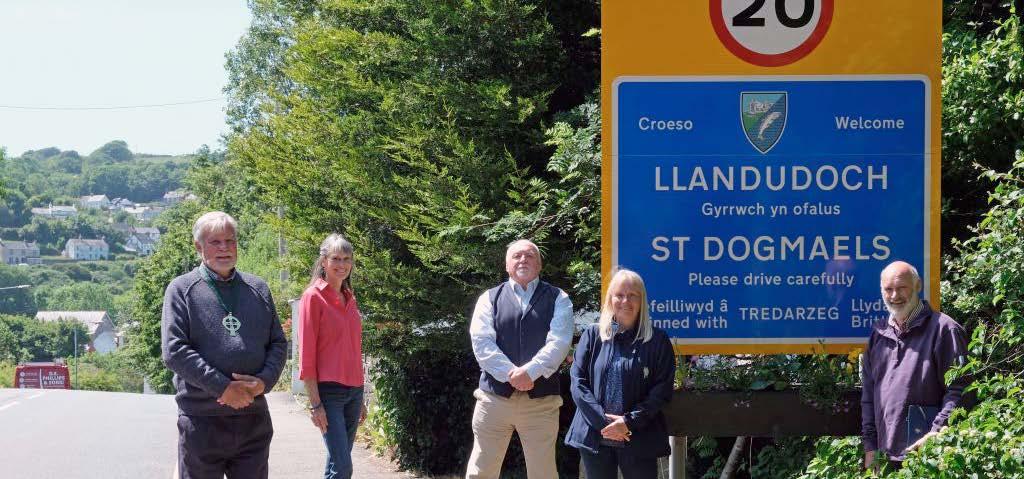
AS Wales marks the one-year anniversary of the introduction of the 20mph speed limit on residential roads, the policy continues to stir controversy.
Initially rolled out by the Labour government with the intention of improving road safety, the reduced speed limit has faced both criticism and support from various quarters, with ongoing debate about its effectiveness and economic impact.
Welsh Conservative Shadow Transport Minister Natasha Asghar has been vocal in her criticism of the policy, calling it a “disastrous 20mph rollout.” She emphasised that despite widespread public dissent, including the largest petition in the Senedd’s history and predictions of a £9 billion impact on the Welsh economy, the government has been reluctant to reconsider the policy. Asghar reiterated the Conservative stance: “Scrap the £33m scheme altogether, only have 20mph in high footfall areas and get Wales moving again.”
The policy has not only faced political opposition but also a significant public backlash. A petition against the
default 20mph limit garnered nearly half a million signatures, highlighting the extent of dissatisfaction among the Welsh public. Additionally, there has been a reported rise in offences related to the new speed limit, with many motorists finding the varying speed limits confusing.
Labour’s Eluned Morgan has acknowledged the policy’s challenges, admitting that the blanket implementation of the 20mph speed limits had caused problems. She indicated that the government recognises that some roads may need to revert to 30mph, and a review is currently underway. The First Minister recently acknowledged that through roads with 20mph limits had been causing the most frustration among the public, and it is now up to local councils to address these concerns.
Lee Waters, the former transport minister who introduced the policy, defended it, stating that reduced speeds have led to fewer accidents and

saved lives. However, he conceded that the rollout could have been better executed, citing insufficient public awareness and preparation for such a significant change.
Despite the criticisms, recent figures indicate a positive trend in road safety, with injuries on 20mph and 30mph roads falling by a third in the final quarter of last year. Furthermore, insurer esure reported a 20% drop in accidental damage claims from Welsh customers following the implementation of the 20mph limit, resulting in reduced insurance premiums for Welsh drivers. If this trend were applied across the UK, it could result in a significant economic benefit, with potential savings of approximately £50 per policy, amounting to £1.4 billion nationwide.
The introduction of the 20mph speed limit has also affected events such as the Junior Tour of Wales cycling race, which had to be shortened and rerouted due to the new speed regulations. This has prompted criticism from Conservative figures who argue that such policies should not negatively impact sporting events and other activities.
Natasha Asghar further commented on the need for a “common-sense approach” to active travel, highlighting that while promoting walking and cycling is important, the current strategy of pushing people out of cars through measures like the 20mph limit is not practical or effective.
The Welsh government’s decision to make 20mph the default speed limit in built-up areas has sparked a complex debate, balancing road safety against public opinion and economic concerns. With a review in progress and ongoing discussions, the future of the 20mph policy in Wales remains uncertain. Whether the government will make adjustments or hold firm in its commitment to reduced speed limits will likely continue to be a point of contention in Welsh politics.

A WELSH Labour minister has defended the decision to cut winter fuel payments for most pensioners, sparking heated debate in the Senedd. The changes, which could see an estimated 500,000 pensioners losing up to £300 this winter, have drawn sharp criticism from both Conservative and Plaid Cymru members.
During Wednesday’s debate, Conservatives called on Labour to urge the UK government to reverse the plans, warning of a “devastating impact” on vulnerable pensioners. Social Justice Secretary Jane Hutt responded by highlighting the “difficult decisions” being made due to a £22 billion “black hole” in UK public finances. Hutt argued that these cuts are a consequence of “14 years of Tory austerity and economic mismanagement.”
Plaid Cymru supported the Conservative calls to reverse the cuts but also accused UK Labour of continuing Conservative “austerity” policies. Despite the opposition, Labour defeated the motion to reverse the decision in a narrow vote, with many Labour Senedd members absent from the debate.
Both Conservatives and Plaid Cymru warned that the cuts could have dire consequences. Conservative South Wales Central MS Joel James opened the debate, stating that the Labour government would be “taking vital income away from those who most need it.” He cited Labour Party research suggesting that scrapping universal payments could lead to an increase in excess deaths by almost 4,000 this winter.
Plaid Cymru’s Sioned Williams echoed these concerns, accusing Labour of exacerbating inequality through austerity measures that disproportionately affect those on low
incomes. “Austerity measures deepen inequality by exacerbating the hardship faced and felt by people on low incomes while enabling the wealthiest to shoulder the lightest burden,” Williams said.
Jane Hutt, one of only two Labour speakers in the debate, defended the cuts, emphasising the financial constraints faced by the UK government. She mentioned a £22 billion shortfall in public finances, necessitating “difficult decisions.” Hutt also highlighted efforts to promote pension credit uptake and mentioned several Welsh government schemes, such as the emergency discretionary assistance fund, which she said were underutilised by pensioners.
Despite her defence, Hutt had previously acknowledged that the cuts risked “pushing some pensioners into fuel poverty.” Welsh First Minister Eluned Morgan also stated that “no one in Labour is happy” with the move but maintained it was necessary to balance the budget.
Conservatives in the Senedd chamber challenged the validity of the £22 billion “black hole” claim. Janet Finch Saunders demanded evidence to support the figure, questioning the minister’s assertion. The Conservatives argue that the cuts will have severe repercussions on pensioners, with some, like Andrew RT Davies, pointing out that even those marginally over the pension credit threshold will lose out on the £300 payment.
Labour MS Mike Hedges was the only other Labour politician to speak during the debate, suggesting that the cuts were necessary to focus support where it’s most needed. He questioned the fairness of providing winter fuel payments to wealthy individuals, listing names like Paul McCartney and Elton John as examples of those who do not
A DOG that was seen running loose on a main road in Milford Haven was found to be an unregistered fighting XL Bully which, according to police experts, had the strength to cause someone ‘substantial injury’.
Officers were called to a property in Milford Haven on March 24 following numerous reports from members of the public that a dog was running loose on the road, causing what the Crown Prosecution described as ‘a hazard’ to drivers. There they found the dog enclosed in a front garden.
This week it’s owner, Megan Pouparrd, 20, of Sunningdale Drive, Hubberston, pleaded guilty to possessing or having custody of a fighting dog.
need this support.
Hedges also highlighted the complexities of predicting the impact of the cuts, arguing, “We don’t know how many people are going to die this winter. You can’t know.” He emphasised that a more equitable system would involve pension credit entitlement based on earnings.
The Conservative motion to reverse the changes was narrowly defeated by Labour, with 23 votes in favour and 24 against. Under the new policy, pensioners not on pension credit or other means-tested benefits will no longer receive the annual winter fuel payment. Previously, all pensioners were entitled to this support to help with energy bills.
The winter fuel payment, which totals £200 or £300 depending on the recipient’s age and benefits status, has been a crucial source of support for pensioners during the colder months. The changes come as part of Chancellor Rachel Reeves’s plan to target support to those most in need amidst tight public finances.
A UK government spokesperson defended the decision, telling The Pembrokeshire Herald: “We are committed to giving pensioners the dignity and security they deserve in retirement, which is why we are protecting the triple lock with the state pension set to increase by £1,700 over the course of parliament.” They added that despite the financial constraints, the government aims to continue supporting those in need, with over a million pensioners still receiving the winter fuel payment and the £150 Warm Home Discount scheme.
As winter approaches, the implications of these cuts on pensioners across Wales and the UK remain a contentious and deeply felt issue.
“It was a typical XL Bully dog in relation to its appearance and size,” Crown Prosecutor Abigail Jackson told District Judge Mark Layton sitting at Haverfordwest magistrates court this week.
The dog, which had wandered approximately one mile from its owner’s home, was caught and taken away by officers for further examinations to be carried out to confirm its breed.
A police statement read out to Judge Layton stated that the dog was ‘very restless and curious’.
“He made no attempt to jump on us and was more interested in finding out about his new surroundings,” said the report.
“He was a very relaxed dog, but was also extremely strong, and could easily have knocked someone off their feet.”
A destruction order for the dog was submitted to the court by the police, however following a request by District Judge Mark Layton, this was delayed pending a behaviourist report to be carried out on the animal.
Sentencing was adjourned to October 8.

A MAN has been sentenced to prison for coercive control after subjecting his partner to a campaign of manipulation and control. Wayne Davies, formerly of Milford Haven, was handed an 18week prison sentence at Swansea Crown Court after admitting to a series of controlling behaviours.
Davies, 47, who had been living with his partner in Milford Haven, initially denied the charges but changed his plea to guilty on the first day of his trial. The court heard that he had been in custody since his arrest in March, and with time already served, it is likely he will be released imminently.
The case revolved around Davies’ behaviour towards his partner
between 1 October 2023 and 3 March 2024. The couple had met on the dating app Tinder, and Davies moved in with the woman within two months, following his eviction from his own accommodation. At first, the relationship appeared to be going well, with no apparent issues.
However, as the relationship progressed, Davies’ behaviour became increasingly controlling.
Prosecutor Alycia Carpanini described how he deleted his partner’s social media accounts, including her TikTok and Facebook friends, and accused her of having relationships with her colleagues. He also changed her phone password, carried her phone around with him, and attempted to pressure

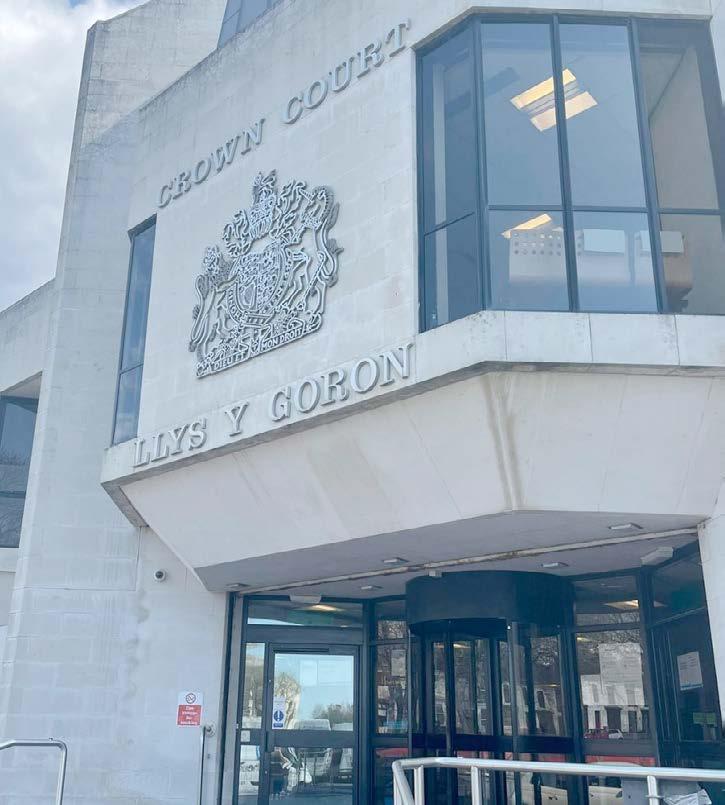
her into selling her car, which held sentimental value as a gift from her late father.
The court heard how Davies’ actions had a significant impact on the woman’s well-being. In her victim statement, she described feeling “anxious, paranoid and on edge” as a result of his behaviour.
In his defence, barrister Hywel Davies highlighted his client’s vulnerabilities, stating that Davies had been diagnosed with autism and suffered from “numerical and literary deficiencies”. He argued that his time in custody had been particularly difficult, describing prison as “absolutely terrifying” for Davies, who felt vulnerable and believed that other inmates had taken advantage of him.
Mr Davies also noted that his client had lost custody of his two children while in prison, a further consequence of his actions. He urged
the court to take into consideration the nearly six months Davies had already spent in custody.
Recorder Aidan Eardley KC, in passing sentence, acknowledged the distress caused by Davies’ actions, stating that his behaviour had caused “serious alarm and distress” to his former partner. Davies was sentenced to 18 weeks in prison, followed by a year of post-sentence supervision.
dditionally, a five-year restraining order was imposed, forbidding Davies from contacting the woman or her mother and from approaching their home. Despite the sentence, the time already served means Davies is likely to be released soon.
This case underscores the seriousness with which the courts view coercive control, a form of domestic abuse that often goes unseen but has profound effects on victims.

WHILE most of us still believe that a meal means meat, the notion that the bulk of ones nutrition could come from plants is fast spreading.
Across Pembrokeshire Grwp and other organisations have been celebrating food and especially vegetable cuisine.
In Dezza’s cabin charismatic Ellen Picton demonstrated how to make a meal from mostly veg, aided by cheese, eggs, dairy yoghurt and two oxo cubes. Her cottage pie, fried pizza and home made granola meal cost around £5, a fraction of ready meals and many times the nutrients and taste. She fully understood the struggle to eat well on less, and shared her tips and arts for how to achieve this.
The lads at the back of the gathering interjected with amusing comments through the demo, but there was silence while we ate the results. The younger audience sought ways to follow the experience up by going to more of her cookery demos. Ellen had used half the usual mince, blending in lentils which enriched the taste of the meat and were indistinguishable from it. The topping was a mash of organic root veg, eaten hungrily by children who reject vegetables presented alone on the plate.
Two boxes of Underwoods organic veg were shared around afterwards and disappeared in minutes.
The community run a Sunday gardening group at the centre and are seeking funds to strengthen the fencing to prevent roaming horses eating everything they grow and to complete a wheelchair accessible pathway.
Ellen built up her business in Milford as a nutrition and health therapist and adviser. This autumn she is invited to new venues to share her insights and simple affordable recipes with fresh audiences. She is touring the county’s schools in hopes the children can influence home cooking in the county.
In Pembroke, the Town Team put on Pembroke Soup. Rhian who organised it wrote in amazement: “Pembroke Peeps… you turned out in force and consumed:
• 25 litres of soup
• 80 bread roles
• 5 blocks of cheese
• 5 blocks of butter
That’s pretty impressive by any standards!”
There was an array of veg base

Vicky Moller vickymoller@gmail.com
soups, so hard to choose I think a few people sneaked a second helping to try another. They were made by local businesses: West Gate Gallery, Pembroke street pastors, Underwood Farm and Dinky Dogs.
Between eating and chatting, organisations and businesses gave little talks with their business story. Several were local young people at the start of their business story. A bakery is saving for its first commercial oven as they are only able to bake two loaves at a time. Underwood organics deliver veg boxes in the area, despite the battle with worsening climatic conditions (cold springs, excess rain and winds) their healthy fare is spreading in the town. A challenge is to achieve a price that those who need good food the most can afford.
Grwp supported other food events. NAEG, the aptly named Newport Area Environment Group held a day of food events starting in Nevern Valley Veg organic horticulture farm, then at a cocooking session in the hall with Ein Cegin followed by a sit down long tables feast. Finally Welsh food historian Carwyn Graves talked about his book, Tir. The land of Wales, its farmers, history, wildness and future and the culture growing from it, are revealed by a gentle humorous fiercely honest scholar.
His quiet words are like a balm to the soul as he takes us to a saner past, not perfect but one where the land was full of both farmers and wildlife. Since the 1950’s when there was no protected landscapes, no national parks, sites of special scientific interest, areas of outstanding natural beauty and the rest, we have lost most of our farmers working the land and most of our wildlife. Good farming does not have to be intensive or nature hostile. Humans and the rest of nature can both compete and coexist if we use our own past to recreate a saner future. All the designations in the world cannot save nature alone, but our farming methods can.
New events:
Ellen’s September cooking demos are at Giraldus centre Manorbier 24 Sept 2.45 to 4pm and Foundry House, Pembroke 27 Sept 2.45-4pm Tickets via Health Aspire facebook
There are food festivals in Narberth 23-29 Sept and Fishguard 11 – 13 Oct.


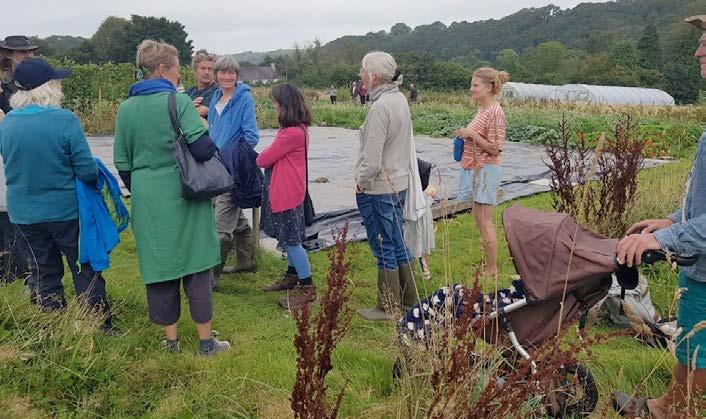


A MAN has been sentenced for carrying out an unprovoked attack that knocked another man unconscious outside Eddie’s nightclub in Haverfordwest.
CCTV footage shown to Llanelli magistrates showed the defendant, David Petrie, 31, stride up to Mr David Corbin as he began walking away from the nightclub’s entrance.
“I can’t remember anything about the incident, and I think this is probably for the best,” Mr Corbin told the court in a victim personal statement.
“This was an unexpected and unprovoked attack, and I’m shocked that it happened. I don’t know [David Petrie], and I have no connection to him.”
The attack took place on the night of October 22 as Mr Corbin made his way from Eddie Rocks.
“The victim was speaking to a female outside the club and the next thing he knew was when he woke up on the ground,” said Crown Prosecutor Abigail Jackson.
“The door staff told him that he’d been hit, and had lost consciousness.”
As a result of the attack, Mr Corbin required five stitches to his right ear and sustained cuts around both his eyes. He also suffered considerable pain as a result of the attack, particularly in his ribs and chest.
Police officers were called to the scene and subsequently arrested the defendant. He was placed inside the cage in the rear of a police van, but began thrashing around violently, and screaming incoherently.
As a result of his behaviour, he was taken to Withybush Hospital but while he was being examined, he began kicking out at the officers.
“He made a number of swings with his right arm which made contact with one of the officer’s right cheek and chin,” said Ms Jackson.
Photographs of the injuries sustained by the police officer and Mr Corbin were shown to the magistrates.
Petrie, of Newport Road, Lower Town, Fishguard, pleaded guilty to assaulting Davd Corbin, causing him actual bodily harm, and of assaulting an emergency worker by beating. He chose to be legally unrepresented in court and chose to say nothing in mitigation.
After considering a detailed probation report, magistrates sentenced Petrie to 22 weeks in custody suspended for 18 months.
He was ordered to pay £750 compensation to Mr Corbin, £85 prosecution costs and a £154 court surcharge. He must wear an alcohol abstinence tag for 120 days and must carry out 20 rehabilitation activity requirement days.

ANOTHER month and another round of dismal NHS statistics have landed in Cardiff Bay.
It would be a change to report that the picture is improving and that politicians have changed their usual schtick. However, the continuing dismal performance of both the Welsh NHS and the parties’ communications machines has ended any hopes that this would be the case.
Let’s start with some facts before looking at the political responses.
The number of patient pathways increased from 791,511 in June to 796,631 in July, the highest figure on record—the equivalent of one in four of the Welsh population.
Around 616,700 individual patients were still waiting for treatment in July.
For the fourth consecutive month, two-year waits have increased. They now stand at 23,830 in Wales. The Labour Health Minister, now First Minister, Eluned Morgan, promised to eliminate these waits by March 2023 and again by January 2024 but failed to meet these targets. Strangely, Baroness Morgan had to make a special effort this summer to find out that lengthy waiting times were an issue for the public.
And, of course, that they are a major electoral issue for Labour in Wales.
At the end of July, the average (median) time patient pathways had been waiting for treatment was 21.9 weeks, an increase of 0.2 weeks from the previous month.
In July, only 51.8% of red calls (the most serious) received an emergency/ ambulance response within eight minutes.
Performance decreased to 55% in July compared with 56.7% in June against the 62-day target for people starting cancer treatment.
Only one of Wales’s seven health boards is currently hitting any of the performance targets.
Jon Coles jon.coles@herald.email
First out of the traps with a response was Jeremy Miles, the new Cabinet Secretary for Health and Social Care.
Like every predecessor, Mr Miles first hid behind the human shield of NHS staff to try to deflect criticism.
He said: “High-quality, lifesaving, and life-changing care is provided every day by hard-working NHS staff throughout Wales in the face of continued pressures on services.”
Every Welsh Government statement issued in the last twenty-five years about its dismal record of improving Welsh healthcare uses that formula. The Welsh Government wants the Welsh public to believe that criticising the NHS as an institution is the same as criticising doctors, nurses, and all other frontline health workers. It’s not, and it’s time to change the record.
“Despite record levels of demand, these figures show positive progress in cancer care, ambulance response time and emergency department performance.
“But there is much more to do – the public rightly wants to see waiting times come down and faster access to care and treatment.
“These figures show more than 2,000 people started treatment for cancer in July – the second highest figure on record – and almost 16,000 people received the good news they didn’t have cancer, the highest figure on record.
“There was an improvement in response times to the most serious 999 calls in August and a welcome fall in the number of people spending more than 12 hours in emergency departments before admission or discharge.
“These figures also show a reduction in long waits for diagnostic tests and therapies. However, it is disappointing the number of long waits for referral to treatment has increased for the fourth
month, despite previously falling for 24 consecutive months.
“While the trend in long waits has shown a recent increase, we have seen continuous improvements in previously very challenging areas such as orthopaedics, with two-year waits continuing to fall across all health boards over the last year.”
Mr Miles’s opposite number on the Conservative benches, Sam Rowlands MS, was as predictable as the Cabinet Secretary’s.
Mr Rowlands said: “Waiting lists are completely out of control on Labour’s watch.
“Baroness Morgan cannot pass the buck for these statistics because she was Labour’s Health Minister for three years and promised to get them down.”
Fair enough, so far. Then…
“Instead of prioritising the creation of 36 more politicians, Labour should have been recruiting more doctors and nurses to end the staffing crisis and free up more cash by ending the Welsh NHS’ over-reliance on agency workers.”
The first part of that sentence is unnecessary cant, as it has been in virtually every single Conservative press release on NHS performance since 2022.
Mabon ap Gwynfor, Plaid’s Health Spokesperson, said the same as he and previous Plaid Health spokespersons have said before: “Labour lost control of the NHS a long time ago yet continues to blame everyone else for its own failings.
“With a staggering 600,000 people on waiting lists in Wales – the highest on record – it’s clear that Labour cannot keep doing the same things over and over and expect different results.”
So far, so familiar.
Then Mr ap Gwynfor came up with something comparatively new: “If the NHS is to live for another 75 years, it needs reforming.”
Pressing the button on some of Baroness Morgan’s more startling recent pronouncements, Mabon ap Gwynfor continued.
“The First Minister has made it clear that reforms aren’t on the cards until waiting lists come down.
“This week, the First Minister blamed health board bosses for these failures despite managing the health portfolio until very recently. She has also blamed the people of Wales for their health conditions and blamed patients for turning up to A&E. It seems that it is always someone else’s fault while this Labour Government refuses to take any responsibility.”
And we return to Baroness Morgan of Ely.
Jeremy Miles’s immediate permanent predecessor made it clear this week that she wanted health boards to improve their performance, hold their executives accountable, and delegate
powers to boards to allow them to make improvements.
Baroness Morgan’s words caused raised eyebrows.
The director of the Welsh NHS Confederation, Darren Hughes, said: “We know that getting the NHS back on track is a top priority for the public, given it affects so many of us, including our loved ones. Nobody wants to provide timely, quality care and treatment to those who need it most more than NHS leaders and staff, all of whom work tirelessly towards this every day.”
Darren Hughes continued: “The First Minister knows all too well from her time as Cabinet Secretary for Health and Social Care that the NHS is treating more people than ever before and that there are a range of factors impacting the rate of elective recovery.
“Waiting lists cannot and must not be considered in a silo but as part of the whole health and care system, across primary care, community care, mental health services and social car
Mr Hughes added: “The ability to discharge medically fit patients from hospital remains a huge challenge for all health boards due to the immense pressures in social care, despite best efforts in joint working with local authority partners.
“In some hospitals, 20% of beds are unavailable as patients wait to leave the hospital. This is like trying to run the NHS with one hand tied behind your back –we’re doing all we can to work with local

authority leaders and care providers, but the First Minister must be open about the scale of the challenge and what’s needed to put it right.”
Opposition politicians failed to pick up on what the First Minister said about ” delegating ” responsibilities to health boards.
For over a decade, Welsh Health Ministers have washed their hands of NHS performance, saying that provision is down to the individual health boards. However, a government can only delegate the powers and responsibilities it holds. Either the Welsh Government has always had the power and responsibility to improve NHS performance, or it hasn’t.
If it hasn’t, and ministers have previously been very clear about who carries the can for NHS performance (not them), Eluned Morgan’s words are empty.
If ministers have always had the power to improve the NHS by using the powers and responsibilities that they are only now passing over to those at the sharp end, you have to wonder why they haven’t used them until now and why it’s only now they’ve passed them off to health boards.
That is not a semantic point. It goes to the foundation of what Eluned Morgan says about making health a priority (as if it wasn’t before). It certainly adds some force to Darren Hughes’s observation that health boards are battling issues within the Welsh NHS with one hand tied behind their backs.
A SAUNDERSFOOT man has been sent to Crown Court for sentence after breaching a sexual harm prevention order for the second time.
Owen Davies, 26, was subjected to the order in 2022 after being convicted of possessing indecent photographs of a child.
But on August 26, Davies, of Pennant Avenue, Saundersfoot, was found to have accessed the Snapchat web, which is designed to automatically delete all one-toone and group chat snaps after they have been viewed by the recipients.
“Snapchat doesn’t retain the history of the user, and the defendant had been warned that he was not to use it,” said Crown Prosecutor Abigail Jackson.
Ms Jackson went on to say that in October 2023, Davies was convicted of breaching the sexual harm prevention order. As a result of this being the second similar offence, District Judge Mark Layton declined jurisdiction in the case and sent the matter to Swansea Crown Court for sentencing. This will take place on OCtober 1.
Davies was released on unconditional bail.

BRUCE Nankervis, of Flat 3 Farmers Arms, Whitland, appeared before Llanelli Magistrates’ Court facing charges of fraud by false representation. The court heard that Nankervis committed the offences in April and May 2023 by accessing the bank account of Angela Chatfield, intending to cause her loss.
On 24th April 2023, 25th April 2023, and 2nd May 2023, he dishonestly accessed Chatfield’s account without her knowledge or permission, taking advantage of his position of trust. Nankervis pleaded guilty to the charges on 28th August 2024.
The magistrates sentenced Nankervis to a suspended custodial period of 24 weeks, with a supervision period of 12 months, citing his flagrant disregard for people and their property and the fact that the offences were committed against a vulnerable person. The sentence was suspended to allow for his rehabilitation, maintain his recently acquired home, and enable him to reconnect with his daughter. He was also ordered to comply with rehabilitation activity requirements for up to 15 days and perform 50 hours of unpaid work within 12 months.
Additionally, Nankervis was ordered to pay £85 in costs to the Crown Prosecution Service, a £154 surcharge, and £1,484 in compensation to Angela Chatfield. Payments are to be made in monthly instalments of £40 starting from 16th October 2024.

A SOUTH Wales prison where 10 inmates have died this year has made “considerable progress” in its management, according to a Welsh government minister.
Jane Hutt, the Social Justice Minister, stated that HMP Parc in Bridgend, which houses man prisoners from Pembrokeshire, is now “much, much more stable.” The prison, operated by security company G4S, has faced allegations of drug misuse but maintains it has a “zero-tolerance policy towards drugs.”
Minister Hutt said she received reassurances from Ian Barrow, who oversees the management of Welsh prisons, that there had been significant improvements at Parc following the appointment of a new director in June.
The minister announced plans to visit Parc later this month alongside the UK government’s prisons minister, Lord Timpson.
Will Styles was appointed as the new director of Parc after Heather Whitehead stepped down. Styles, who has been with G4S for a year managing HMP Five Wells in Northamptonshire, took over the role following Whitehead’s departure. G4S stated that her immediate exit in August 2023 was “not in response to one single incident.”
Since February, 10 inmates have died at the prison, with at least four of the deaths believed to be drug-related. In June, three prisoners were also hospitalised following disorder at the facility.
South Wales Police reported in March that a synthetic opioid, Nitazene, had been identified in connection with all four drug-related deaths, with another synthetic drug, Spice, also identified in two of the cases. G4S reiterated its “zero-tolerance policy towards drugs” in response to these findings.
The deaths have sparked protests from the families of inmates who died while in custody. In May, they demonstrated outside the prison, demanding answers from authorities regarding claims of drug misuse within the facility.
At the Social Justice Questions session in the Welsh Parliament on Wednesday, Conservative Senedd member Altaf Hussain expressed concerns about healthcare at Parc. In response, Jane Hutt extended her thoughts to the staff and families affected by the “deeply concerning” deaths in custody earlier this year.
Hutt stated that she met Ian Barrow last month and received “reassurances on the progress made at Parc” since the new director’s appointment. “My understanding from that meeting is that Parc has made considerable progress since the spring,” she added. “It’s now

harm inflicted upon inmates by both staff and senior management of the prison.
much more stable.”
She confirmed her upcoming visit to the prison with Lord Timpson on 30 September.
However, the minister’s comments have been met with criticism. Zack Griffiths, a former inmate of Parc Prison who was first sent there in 2016 after being found guilty of conspiracy to supply Class A drugs, has spoken out. Griffiths now runs the HMP Prisons’ Justice Group UK Facebook page, which has over 6,000 members, including many families of those who have died at Parc or have loved ones currently incarcerated there.
In a statement to The Pembrokeshire Herald, Griffiths challenged the minister’s assessment of the situation:
“In response to the misleading statements made by Jane Hutt, the Social Justice Minister, regarding the stability of HMP Parc, I must state that her view is not only inaccurate but appears to be intentionally so. The HMP Prisons Justice Group continues to receive daily reports of significant issues, including drug abuse, corruption, and widespread
“I urge the Minister to engage directly with the prison’s management and visit a unit within the prison to speak with the inmates themselves. It is crucial that she seeks the truth from those living this reality, rather than presenting a false impression to the public.
“It is utterly unacceptable that the Minister fails to acknowledge the 27 families who have lost their loved ones under the care of G4S. Both she and G4S should hang their heads in shame for their negligence and lack of accountability.”
Griffiths’ statement suggests a disconnect between the official narrative presented by the government and the experiences reported by inmates and their families. This tension highlights ongoing concerns about the prison’s management and the challenges faced in ensuring the safety and well-being of those incarcerated at HMP Parc.
HMP Parc is one of the UK’s largest category B prisons, housing convicted male adult and young offenders, as well as convicted sex offenders or those awaiting trial for sex offences.

IN a determined move to protect the welfare of young people, Police and Crime Commissioner (PCC) Dafydd Llywelyn has reaffirmed his commitment to funding the dedicated Schools Programme across DyfedPowys, following the controversial decision by the Welsh Government to withdraw financial support earlier this year.
The decision, made in January, to cut funding caused widespread concern among schools, parents, and the community, as the programme has long been integral in providing dedicated Schools Police Officers. These officers deliver essential educational and wellbeing support to pupils aged 5 to 16 through a bilingual curriculum. The service not only safeguards students but also plays a crucial role in their personal development and pastoral care.
PCC Llywelyn expressed his dismay at the government’s decision, particularly noting the lack of formal consultation with police forces across Wales. Nonetheless, he swiftly intervened to ensure the continuation of the Schools Programme in the Dyfed-Powys region until the end of the previous academic year.
Having secured re-election as Police and Crime Commissioner in May, Mr Llywelyn has since worked closely with local and national partners to devise a long-term plan to secure the future of the Schools Programme. This commitment
Tom Sinclair editor@herald.email
was highlighted during his visit to Ysgol Bro Myrddin in Carmarthen on Wednesday, 18th September, where he observed the implementation of the newly launched School Service.
During the visit, Mr Llywelyn stated, “The safety and well-being of our children is paramount, and the role of the School Police Officers has been vital in creating safe, supportive environments in our schools. Any reduction in support for this service risked compromising the development and security of our young people. That is why I made it a priority to ensure that the Schools Service continues in our area.”
He further emphasised, “This was one of my top commitments during my re-election campaign, and I stand by my promise to support our schools and young people. Maintaining the Schools Service is essential not only for the immediate safety and support it offers but also for the future success and well-being of our students. I will continue to fight for its future and to protect the best interests of our children.”
The importance of the Schools Programme was also supported by Chief Constable Dr Richard Lewis, who highlighted the positive impact of the Schools Police Officers’ work. “I’m a
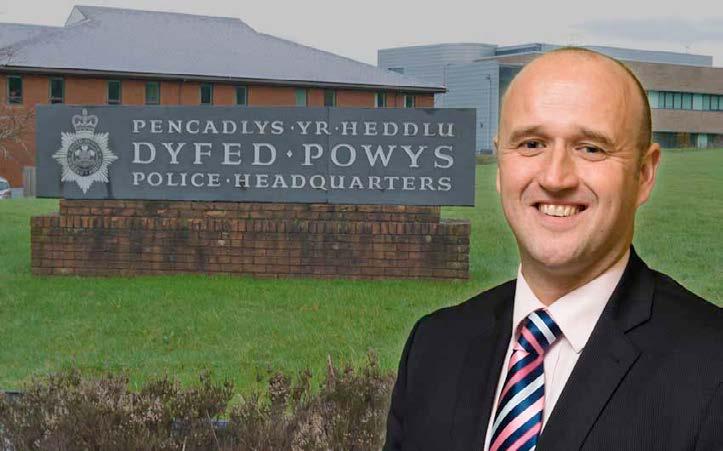
strong believer in the work conducted by our Schools Police Officers – when you spend time speaking to the teams and to the schools who receive the service, their true value is clear,” said Dr Lewis. “While they do the important work of delivering lessons that help children and young people better understand complex societal matters such as violence against women and girls, they also submit referrals on matters of concern and ensure demand to our frontline response teams is cut in several ways – all while preventing unnecessary criminalisation of children.”
He added, “I share the Police and Crime Commissioner’s commitment to the Schools Service and I am delighted we are able to maintain this critical service in Dyfed-Powys.”
The Schools Programme, originally supported by the Welsh Government, has been a vital resource in delivering educational support and ensuring the well-being of students across the region. Now, thanks to Mr Llywelyn’s intervention, the future of this service appears secure in Dyfed-Powys, safeguarding the safety and success of young people for the foreseeable future.
THIS week Pembrokeshire County Council has refuted claims circulating on social media that it was responsible for The Range’s decision not to open a store in the former Wilko unit in Haverfordwest.
The rumors, which gained traction on Facebook this week, suggested that the discount retailer pulled out due to issues related to car parking charges in the nearby Perrots Road car park.
A council spokesperson addressed the situation, on Wednesday (Sept 18) telling The Herald: “There is absolutely no truth in the rumour that The Range decided not to take on the former Wilko store in Haverfordwest due to car parking charges in the nearby Perrots Road car park. The Council is unaware of where this rumour has come from.”
This statement comes in response to a flurry of social media activity, where several residents expressed their disappointment and frustration. One user, Stephen Hughes, sparked conversation with a post claiming, “Range wanted to go to Wilko and the council refused free parking at Haverfordwest absolutely shocking.” The post received multiple comments, reflecting the growing frustration among the community.
Chris Wilson said: “The council seemed determined to wreck Haverfordwest,” while Julie McIntosh added, “OMG we will never have them now.”
These sentiments echo a broader dissatisfaction with the current state of the Haverfordwest town centre.
The council, however, has made it clear that The Range’s decision was independent of any car parking policies. “While The Range ultimately decided not to proceed, the Council is currently in detailed discussions with a prospective tenant for the unit and very much hope to have the building brought back into use as soon as possible,” the spokesperson added.
The speculation on social media highlights the ongoing concerns about the town’s retail prospects and the council’s role in facilitating or hindering economic development.
Recent reports indicate that The Range is expanding in the UK, with five new branches opening by Christmas in locations such as Walkden, Cwmbran, Leamington Spa, Chelmsford, and Oswestry.
Additionally, The Range’s parent company, CDS Superstores, has announced plans to reopen up to 300 Wilko stores after acquiring the brand, with five concept stores expected to open by Christmas 2024
Despite Haverfordwest now being off the list, it remains to be seen how the situation will unfold and whether the prospective tenant will bring a new chapter to Haverfordwest’s retail scene. It
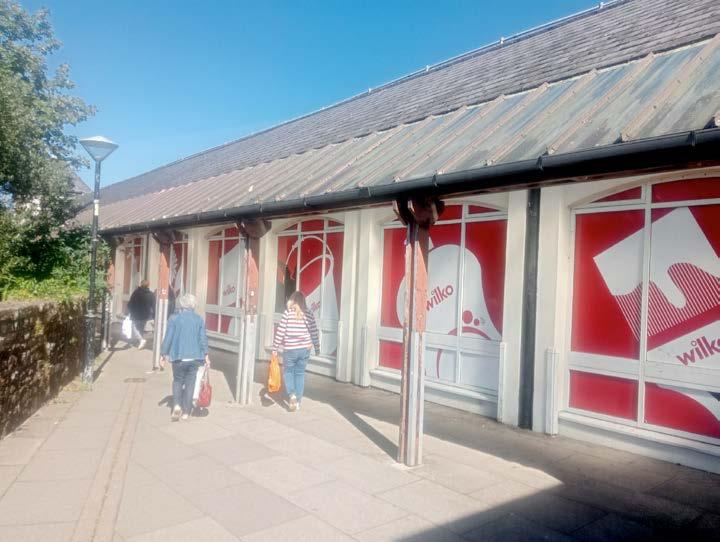

AN ERROR in handling a 999 emergency call made on Christmas Day has been admitted by the Welsh Ambulance Service Trust (WAST) at a recent inquest hearing, following the death of 40-year-old Pembrokeshire mother, Charlotte Burston.
At the pre-inquest hearing held on Friday (Sept 13), WAST acknowledged a critical mistake in responding to urgent calls for medical assistance. Representing WAST, Trish Gaskell stated, “An advanced paramedic practitioner would normally be allocated and should have been allocated to Ms Burston before she was conveyed to hospital. The trust has accepted that error.”
Deputy Coroner Mark Layton confirmed that all reports from WAST, including transcripts of the 999 calls, had been received. He announced plans to commission an independent expert to review the evidence and determine whether a different response from the ambulance service might have altered the outcome. “The expert will examine the evidence and ascertain whether a difference could have been achieved or not had the ambulance service’s response been different,” Mr Layton said.
Charlotte’s family has been left grieving after her death on New Year’s Eve, despite repeated attempts by her 15-year-old daughter, Ella, to call for medical assistance. On Christmas morning, Charlotte began experiencing severe tingling sensations in one of her arms—a potential warning sign of a cardiac event.
“I called 111 at 8:19 am; the call lasted 53 seconds, so I hung up because it was taking too long,” Ella recounted. “I then called 999 at 8:29 am, and the call lasted 41 minutes. The woman I spoke to refused to tell me how long an ambulance would take but just said that one would be arranged.”
Despite these urgent pleas, no ambulance arrived. As Charlotte’s condition worsened, Ella contacted her grandfather, Brian Laye, who lives in Clunderwen. He immediately drove to Llanteg, arriving to find his daughter drifting in and out of consciousness.
“Charlotte was lying on the sofa, struggling to breathe,” Mr Laye recalled. “We were told an ambulance wouldn’t be available for at least an hour and a half. With no time to lose, I decided to take her to Withybush Hospital myself.”
En route to the hospital, Charlotte suffered a major heart attack near Robeston Wathen. Upon arrival at Withybush General Hospital, she was placed on life support and later transferred to Morriston Hospital. Sadly, she never regained consciousness and was pronounced dead on New Year’s Eve.
A post-mortem examination concluded that the cause of death was hypoxic brain injury—a lack of oxygen to the brain resulting from the cardiac arrest.
“If an ambulance had got to Charlotte within 15 minutes of Ella’s first call, she’d


still be with us today,” said Vincent Laye, the father of Charlotte’s daughters. “The pain and the grief that this has left us with is beyond explanation. Our girls have lost a mother who they relied on and who was their best friend.”
Mr Laye expressed deep frustration over what he perceives as systemic failures within the National Health Service (NHS) and WAST. “The bottom line is that the NHS has failed in providing the care that everyone pays for and that every one of us deserves,” he stated.
He added that while schools and local charities like the Sandy Bear Children’s Bereavement Charity are offering support, there has been “absolutely no support” from other authorities. “I truly believe that this awful death could have been prevented,” he said. “Somebody needs to be held accountable for what’s happened, to prevent this from happening to somebody else.”
The depth of the family’s loss was evident as over 150 people attended Charlotte’s funeral. “Our girls have lost a mother who was with them and who cared for them 24/7,” Mr Laye said. “The community around Llanteg has lost a woman who was greatly loved.”
This heartbreaking incident is not isolated. In a similar case, a man in Pembroke Dock died after reportedly waiting nine hours for an ambulance that failed to arrive in time. Despite multiple calls for help, medical assistance did not reach him promptly, leading to his untimely death.
Family members of the deceased have expressed profound grief and
frustration, citing systemic issues within emergency services. “The pain we are experiencing is immeasurable,” a relative said. “No one should have to endure such a wait in an emergency.”
These successive tragedies have intensified public outcry over ambulance response times and resource allocation within WAST. Community leaders and residents are demanding urgent action to address these shortcomings to prevent further loss of life.
Liam Williams, Executive Director of Quality and Nursing at WAST, extended condolences to the Burston family. “We were deeply sorry to hear about Ms Burston’s passing and would like to extend our thoughts and condolences to her family on their sad loss,” he said. “A thorough investigation has begun, and we will be contacting Ms Burston’s family to invite them to participate in this process.”
Sonia Thompson, WAST’s Assistant Director of Operations, acknowledged the extreme pressures on the ambulance service due to wider NHS system issues. “Our ambulance service is under extreme and well-documented pressure as a result of wider system pressures across the NHS,” she noted. “We’re thinking very differently about the way we deliver services in future and are already testing some new ways of working across Wales to understand how we can relieve some of the pressure.”
The Welsh Government has stated that despite budget pressures, it is investing in same-day emergency care, extra community beds, and social care services to improve patient flow through hospitals. “We recognise the challenges
faced by emergency services and are committed to supporting initiatives that enhance response times and patient care,” a spokesperson said.
Mr Laye emphasised that the issue extends beyond his family’s tragedy. “This is about every other person out there who deserves to be looked after when they are most in need,” he said. “The NHS and the local authority have failed us in a way that’s going to change our lives forever, and I’m refusing to allow this to be brushed aside.”
Local officials and healthcare advocates are calling for a thorough investigation into both cases, urging the Welsh Government to implement necessary reforms. The recurring nature of these tragedies underscores the urgent need for improved resource allocation, staffing, and operational protocols within WAST.
As the inquest proceeds, the Burston family and the wider community await answers. The repeated failures in emergency response have prompted calls for systemic reforms within WAST and the NHS in Wales. Without significant changes, the safety and wellbeing of the public remain at risk.
Ms Burston is survived by her two daughters, whose prompt actions highlight the critical importance of effective emergency services. The family’s plight serves as a stark reminder of the real-life consequences of systemic shortcomings in healthcare provision. Their hope is that by sharing their story, they can prevent similar tragedies from occurring in the future.
The next pre-inquest hearing is scheduled for January 17, where it is hoped that the details for the full inquest will be finalised.
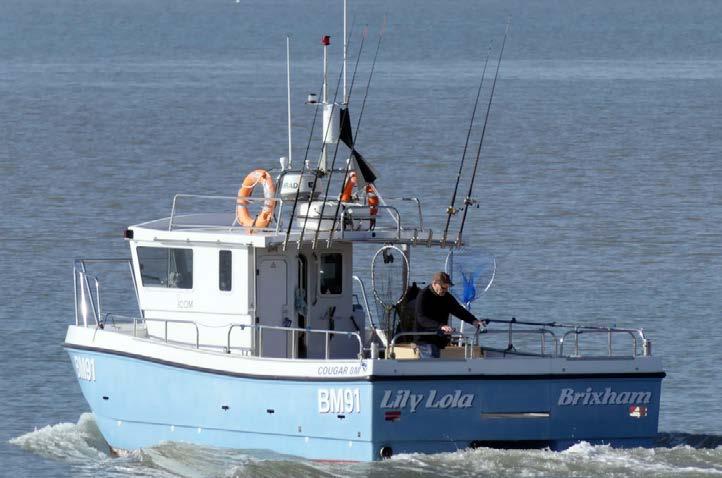
IN what is being described as a major blow to organised crime, authorities have seized approximately one tonne of cocaine from a fishing boat off the coast of Cornwall. The interception, conducted by Border Force officers, has resulted in the arrest and charging of four men, at least two from west Wales, who are now in custody.
The vessel, named Lily Lola, was stopped by Border Force officials off the coast of Newquay on Friday afternoon, 13 September. Onboard, officers discovered a substantial haul of the Class A drug, which represents a significant disruption to the criminal organisation behind the attempted smuggling operation.
The National Crime Agency (NCA) is leading the investigation into this highstakes interception. On Saturday, they confirmed the arrests and subsequent charges against the four men. The individuals have been remanded in
custody and are scheduled to appear at Bodmin Magistrates’ Court on Monday, 16 September.
Two of the men charged are from Swansea, Wales. Jon Paul Williams, aged 46, of St Thomas, Swansea, and Patrick Godfrey, aged 30, of Port Tennant, Swansea, were among those detained. Also charged were Michael Kelly, 45, of Portway, Manchester, and Jake Marchant, 26, who has no fixed address. All four face charges related to the importation of a controlled Class A drug.
A spokesperson for the NCA outlined the operation: “Four men have been charged with drugs offences after Border Force officers intercepted a fishing boat carrying approximately one tonne of cocaine off the coast of Newquay, Cornwall. The men were aboard the vessel when it was stopped by officers on Friday afternoon.”
Derek Evans, branch commander of the NCA, emphasised the significance of

this seizure: “This is a significant amount of cocaine that will represent a huge loss for the organised crime group that attempted to import it into the UK. With our partners at Border Force and the Joint Maritime Security Centre, we have successfully removed this harmful drug consignment from the criminal marketplace.” Evans also noted the broader impact of such a large consignment of cocaine entering the country. “Its onward supply would have fuelled exploitation through county lines activity as well as serious violence and knife crime,” he said, adding that the investigation into the importation is ongoing.
This recent incident in Cornwall draws parallels to a similar case in Pembrokeshire several years ago. In September 2019, a fishing boat named the “Blues” was intercepted near the coast of Wales, leading to the seizure of a substantial
quantity of cocaine worth around £60 million. The vessel had been monitored as part of a sophisticated operation by law enforcement, culminating in the arrest and conviction of several individuals. The seizure was one of the largest in UK history and highlighted the increasing use of maritime routes by organised crime groups to smuggle drugs into the country. The interception off Pembrokeshire’s coast reminded locals of the persistent threat posed by drug traffickers attempting to exploit the region’s extensive coastline.
The Agency said that this latest successful interception is a testament to the coordinated efforts between the NCA, Border Force, and the Joint Maritime Security Centre, demonstrating the UK’s commitment to combatting drug trafficking and the associated criminal activities it engenders.

POLICE are investigating an incident which occurred at about 1.05am, Sunday, September 1.
A 23-year-old man was taken to hospital with head injuries following the incident on Castle Square, Haverfordwest.
A 21-year old man was arrested on suspicion of assault and later released on condition bail pending further police enquiries.
Anyone with information that could help officers with their investigation is asked to report it to Dyfed-Powys Police, either online at: https://bit.ly/ DPPContactOnline, by emailing 101@ dyfed-powys.police.uk, or by calling 101. If you are deaf, hard of hearing, or speech impaired text the non-emergency number on 07811 311 908.
Quote reference: 36 of the 1st.
Alternatively, contact the independent charity Crimestoppers anonymously by calling 0800 555111, or visiting crimestoppers-uk.org.
A KEY figure in a major drug-dealing operation that stretched across Pembrokeshire, Carmarthenshire, and Swansea has been captured and is now behind bars after 16 months on the run. Lynne Leyson, 51, was arrested on Sunday evening and appeared at Swansea Crown Court on Tuesday, where she was committed to prison to begin her nine-year sentence.
Leyson, alongside her husband Stephen and son Samson, ran a lucrative cocaine and cannabis network from their smallholding in Capel Dewi, near Carmarthen. Despite being convicted for her role in the operation, she went on the run in July 2023, skipping bail just before sentencing. Her husband and son were jailed in her absence.
The family’s criminal enterprise was exposed after a significant police operation, codenamed Operation Hilston, led to the discovery of large quantities of drugs and weapons at their property. Officers from DyfedPowys Police raided the compound in October 2021, seizing more than half a kilo of cocaine, 1.4kg of cannabis, and £17,000 in cash. The haul also included a semi-automatic pistol—the first of its kind ever seized by Dyfed-Powys Police.
The police operation linked the Leyson family’s drug distribution network to dealers operating in Pembrokeshire.
Tom Sinclair editor@herald.email
One individual, going by the nickname Mr Pickles, was identified as a key player selling drugs for the family.
At trial, all three members of the Leyson family were convicted of conspiracy to supply Class A and Class B drugs. Stephen Leyson, 55, was additionally convicted of possession of a firearm. In July, he was sentenced to 11 years in prison, while 22-year-old Samson Leyson was sentenced to six years. In September, Lynne Leyson was sentenced to nine years in her absence, with Judge Catherine Richards describing her as the “dominant force” in the drug enterprise.
Judge Richards noted that Lynne Leyson had played a leading role in directing the drug conspiracy from the farm, using her influence to control others involved in the operation.
Since going on the run, Leyson had travelled extensively across the UK, eluding police for more than a year. However, her return to the Dyfed-Powys Police area on Sunday led to her arrest.
A 26-year-old woman was also arrested on suspicion of assisting an offender but has since been released on bail pending further inquiries.
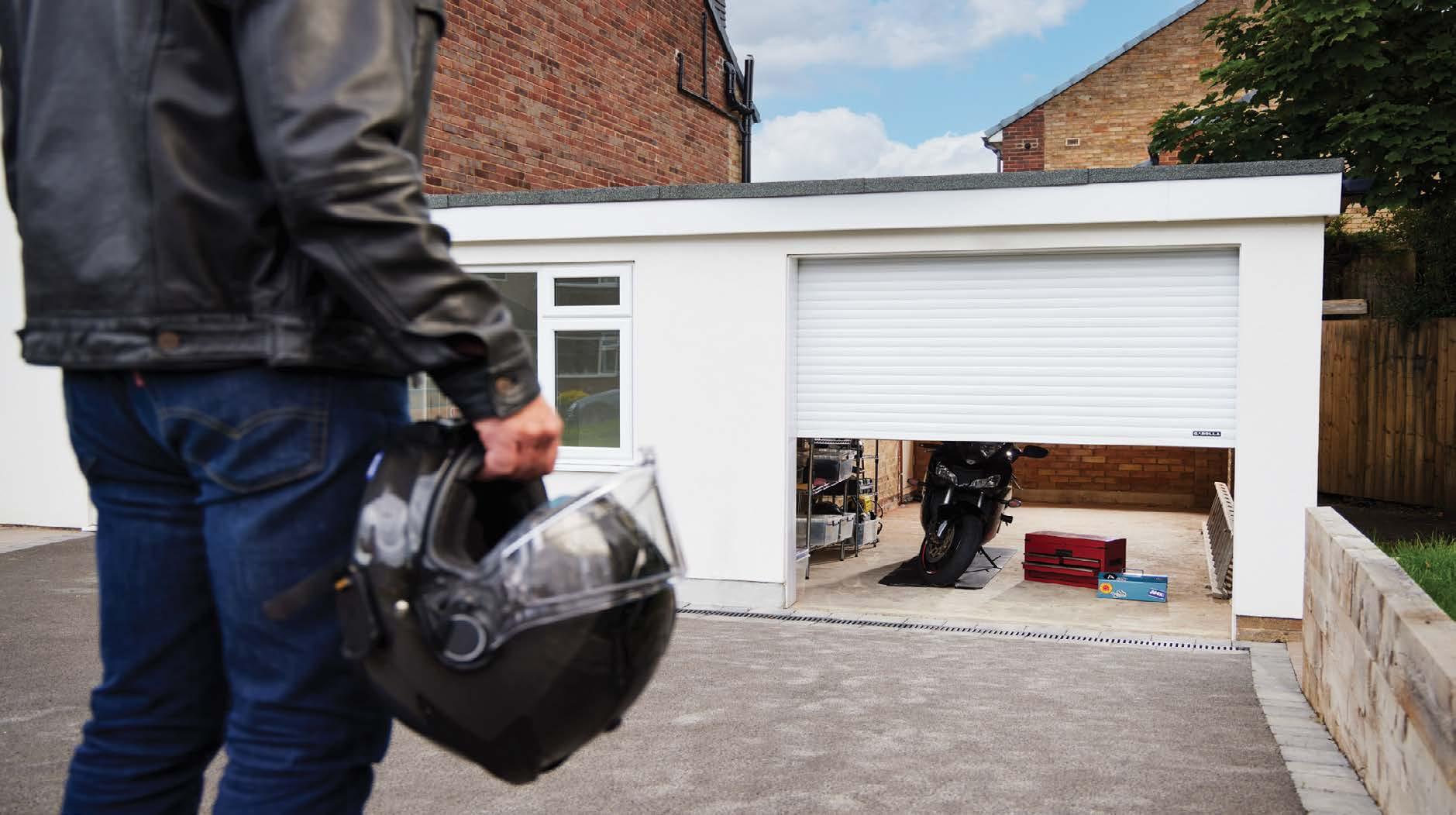

“This arrest shows our determination to find those who think they can evade justice. I would like to thank the public for their assistance and the officers for their dedication and persistence,” he said.
The Leyson family’s downfall
Detective Chief Inspector Rhys Jones, who led the investigation, expressed his gratitude to the public for their assistance in locating Leyson.
marks the conclusion of a long-running investigation and a significant blow to organised crime in West Wales.
The police said that their operation has sent a clear message that drugrelated crime in the Dyfed-Powys area will not be tolerated.

IN response to the latest Public Health Risk Assessment on the Withyhedge landfill site, local representatives Henry Tufnell MP and Eluned Morgan MS have issued a joint statement addressing both the improvements and ongoing concerns related to air quality in the region.
Henry Tufnell MP acknowledged the recent positive developments in air quality data, but expressed frustration over the situation. “It is crucial to remember that
Tom Sinclair editor@herald.email
this situation should never have arisen in the first place,” said Tufnell. “The impact on our community has been profound, and people have endured far too much suffering. While emissions may be within regulatory limits, this does not mean that residents are unable to detect the odour.” He emphasised the need for stronger regulations around landfill management,
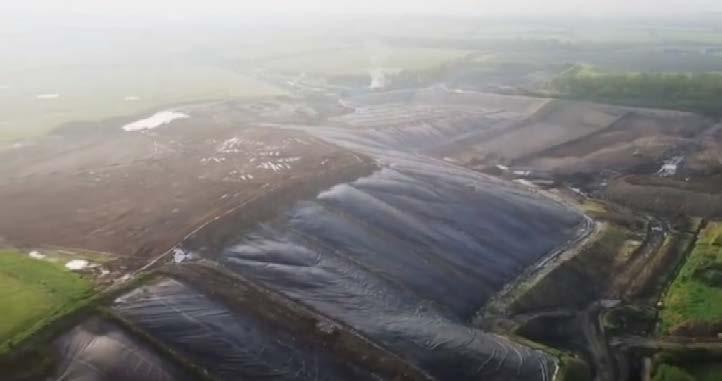
pledging to work closely with the Welsh Government to ensure such disruptions are prevented in the future.
Eluned Morgan MS echoed this sentiment, welcoming the reduction in odour levels but stressing the importance of maintaining these improvements. “It is welcome news that the smell coming from the Withyhedge landfill site has reduced considerably, offering much-needed relief to the local community,” Morgan said. However, she also cautioned that “it is crucial that these improvements are not temporary,” adding that continued monitoring and proactive action are essential to avoid a recurrence of the problem.
The public health risk assessment, conducted by Public Health Wales, confirmed that hydrogen sulphide levels from the landfill had periodically exceeded the World Health Organization’s odour annoyance guidelines, though the longterm health risks are considered low. Residents had reported significant discomfort, including headaches, nausea, and dizziness, linked to the odour. Both Tufnell and Morgan stressed the need for long-term solutions to safeguard the health and well-being of their constituents. As the situation evolves, further updates and assessments are expected to ensure the landfill site remains compliant with health and environmental regulations.

AT THURSDAY’S hearing before the Senedd’s public accounts and public administration committee, Welsh Government officials revealed that there is currently no “exit plan” for the government to sell Cardiff Airport. This statement came during a session where airport executives and government officials faced questions about a proposed £206 million subsidy intended to support the airport’s growth and development. This move, if approved, would mean the government has invested nearly £400 million in Cardiff Airport since its acquisition in 2013.
Andrew Slade, the Director General for Economy, Energy, and Transport, defended the government’s stance, highlighting the strategic importance of the airport for Wales. “We are committed to the airport and ministers are very clear that Wales needs to have an international airport,” he stated, emphasising the economic contributions and potential surrounding Cardiff Airport. He acknowledged the long-term possibility of exploring different ownership models but indicated that such considerations are not a priority at present. This proposal aims to boost job growth linked to the airport and attract new airlines and routes, with a target of increasing passenger numbers to over two million annually. Planned upgrades to the terminal and facilities are also part of the proposed investment. While the subsidy has been sent to the Competition and Markets Authority for review, Slade confirmed that their advice would not be binding, leaving the final decision to the Welsh Government.
During the hearing, Cardiff
Tom Sinclair editor@herald.email
Airport’s Chief Executive, Spencer Birns, disclosed ongoing discussions with airlines such as Jet2, EasyJet, and Ryanair to establish operations at Cardiff. However, he noted that these airlines currently do not see Wales as a “significant marketplace” for investment. Birns explained that while the airlines using Cardiff Airport are growing, the airport has faced challenges in replacing carriers that have pulled out, notably Wizz Air, which was an integral part of their growth strategy. He emphasised that while the airport has recovered 52% of its 2019 passenger volume, achieving pre-pandemic targets remains difficult due to the limited availability of aircraft and a tendency for airlines to prioritise larger markets.
The airport had previously set a target of 1.3 million passengers, but this milestone is now expected to be reached two years later than initially planned, by March 2028. Birns attributed this delay to the withdrawal of Wizz Air and route cancellations by airlines like Ryanair. Despite these setbacks, he pointed out a 7% growth in passenger numbers for 2024, asserting that Cardiff Airport is on a positive growth trajectory.
Questions about the financial aspects of the airport’s operations were also raised during the hearing. Conservative MS Natasha Asghar sought detailed information on how the funds provided by the Welsh Government have been utilised. Slade agreed to provide a summary to the committee but cited commercial sensitivities and security concerns for not disclosing more specific details.


The committee discussed the cost implications of upgrading airport facilities, including the installation of new security scanners. While these scanners were included in the airport’s rescue and restructuring plan, the actual costs exceeded initial estimates. Mr. Slade explained that retrofitting modern equipment into a terminal designed in the 1970s presented significant challenges, leading to additional expenses. Cardiff Airport was allocated an extra £6.6 million by the Welsh Government in October to cover these costs.
Environmental considerations were also highlighted, with Birns reporting a 60% reduction in carbon emissions at the airport over the past four years, from 1,700 tonnes to under 600 tonnes of CO2 annually. This reduction was achieved through measures such as switching to electric vehicles, using renewable energy, and minimising natural gas consumption. The airport aims to further cut its emissions by 50% within the next five years, aligning with Wales’ broader environmental goals.
The airport’s role in Wales’ economy was underscored, with Birns stating that Cardiff Airport generates approximately £200 million in economic value, working with 50 companies and supporting 4,000 jobs. The proposed £206 million subsidy
is seen as a means to sustain and enhance this economic contribution.
However, the airport has struggled to retain and attract international routes. The direct flights to Doha with Qatar Airways, which were suspended during the pandemic, have yet to resume. Negotiations with Qatar Airways are ongoing, but details remain commercially sensitive.
The proposed subsidy and the future of Cardiff Airport have sparked debate among Welsh politicians and the public. Critics argue that the airport has not met growth expectations and question the continued injection of taxpayer money. Some point to other regional airports, such as Teesside, which have recovered more rapidly post-pandemic and have clearer plans for financial sustainability.
In contrast, supporters emphasise the strategic importance of maintaining an international airport in Wales, not only for travel convenience but also for the economic and employment benefits it brings. The Welsh Government’s commitment to the airport, despite its challenges, reflects a belief in its potential to contribute significantly to the region’s growth and connectivity.
As the Welsh Government awaits the Competition and Markets Authority’s advice on the subsidy, the future of Cardiff Airport hangs in the balance. Whether this latest investment will spur the airport towards its ambitious growth targets remains to be seen. However, for now, the government appears steadfast in its support, with no plans for an exit strategy in sight.

A PEMBROKESHIRE man tragically died after suffering a cardiac arrest during a gruelling nine-hour wait for an ambulance. David Bye, of Hill Farm Park, Pembroke Dock, passed away in the early hours of Monday, 1st July.
His wife Pauline, in the picture with her late husband above, has described the extensive delay as “unforgivable.”
The Welsh Ambulance Service revealed that on the morning Mr. Bye died, ambulances across the Hywel Dda University Health Board region spent more than 250 hours waiting outside hospitals to offload patients. This region includes Carmarthenshire, Pembrokeshire, and Ceredigion.
Recalling the distressing events of that night, Mrs. Bye stated, “Nine hours after falling off the bed and us calling for an ambulance someone finally came, but it was too late, and David died.” David had a long history of heart disease and lymphoedema following a triple bypass and aortic
valve replacement four years ago, frequently requiring care at Withybush Hospital.
“I became very worried about David’s condition,” Mrs. Bye continued. “I rang 999 at 6pm for an ambulance but was told none were available. I rang again at midnight and was told there were still no ambulances available and to try and make David as comfortable as possible. By that point, David was still talking to me but was very confused, a worrying sign of a possible cardiac arrest.”
Despite making her husband as comfortable as possible, Mrs. Bye grew increasingly concerned. “He complained of back pain but had no other injuries. His breathing was okay, though he was clearly confused and his responses were delayed. I couldn’t lift him as he weighed 17 stone, and there were no neighbours to help me.”
As Mr. Bye’s condition worsened, Mrs. Bye made a third call to emergency services. “He slowly

deteriorated, became more sleepy and stopped talking to me,” she said. “I called ambulance control again at 3.15am and the answer was the same—no ambulances available. While I was on the phone, David had a cardiac arrest. Then it all kicked off. The rapid response team arrived within minutes, followed by more responders, two fire engines, and an ambulance.”
Mrs. Bye praised the efforts of the emergency services who tried to save her husband but felt compelled to speak out about the prolonged wait. “I’m very angry about it,” she said. “I don’t like to make a fuss, but this has been a horrible experience and a huge shock. We know we live in a rural location and understand ambulances might take a little longer. I might have been able to understand a couple of hours, but to take nine hours just seems unforgivable to me—especially when as soon as he began to die, they arrived very quickly.”
The Welsh Ambulance Service cited wider systemic issues as a contributing factor to the delays. On the night and morning in question, ambulances in the region spent a total of 250 hours waiting to transfer patients into hospitals. Liam Williams, executive director of quality and nursing at the Welsh Ambulance Service, acknowledged the delay, saying, “Regrettably, poor ambulance response times are well documented and unfortunately a symptom of much broader system-wide pressures, including hospital handover delays, which impact our ability to reach patients quickly.”
He also mentioned that in July, the average response time to immediately life-threatening red calls was over eight minutes, an increase compared to pre-pandemic times when the median response ranged between four and six minutes.
Mr Williams added said: “On behalf of everyone at the Welsh Ambulance Service I would like to extend my condolences to the family of Mr Bye on their sad loss.
“This is not the standard of service we want to provide and we recognise that this is not what the public rightly expects of us.
“As a result we continue to work with health board colleagues to find local solutions to the challenges faced and we are also looking at evolving our current service model further.
“As part of this we will increase the involvement of paramedics and nurses in our clinical contact centres when patients call to help ensure that patients like Mr Bye get help quicker. I would like to invite a representative of Mr Bye to contact the trust’s Putting Things Right team so we can investigate the incident fully and offer a comprehensive response to them.
“I would once again like to extend condolences on behalf of the trust to Mr Bye’s family at this very difficult time.”
IS THERE any experience that is more dispiriting than waiting in A&E?
My cousin Iori called me late on Friday evening.
He was in pain. Much pain. The sort of pain that left him howling in agony down the phone.
Poor Iori. He’d come off his bike the previous week, been taken to hospital, spent hours waiting in agony, been told he’d cracked a rib or two, and sent home with some paracetamol.
On Friday, he’d sneezed, and something had gone “pop” inside him. Now, he was in the sort of pain that would have him rolling on the floor if only he could move. He was struggling for breath and dared not sneeze, belch, or fart for fear of being reduced to babbling incoherence in his torment.
Poor Iori.
Then came the kicker.
Iori cannot drive. He’d phoned an ambulance and been told that, despite his difficulties breathing and the previous week’s accident, an ambulance would not reach him for twelve hours. As he lives no more than three miles from the ambulance station, that suggests that the 20mph speed limit is being observed even more strictly than one might have supposed.
With a smile in my voice and woe in my heart, I agreed to take him to Withybush. When we got there, the Department was empty.
Iori shuffled to the desk, gave his details, and explained his difficulties and level of pain.
Within one short hour of arrival, just about, he was seen by the triage nurse. She gave him a couple of co-codamol to take and told him to wait.
Unable to sit and unable to walk, Iori found himself a handy wall to lean against, and we began to wait.
And wait, and wait, and wait. Iori couldn’t always stifle his groans of agony, no matter how he clenched what was left of his teeth. Meanwhile, my backside was getting numb as we waited. And waited. And waited.
Three hours later, Iori was called through for a consultation. When he went through, I wandered outside for a stroll around the car park. I popped to the hospital shop, where I wondered whether the price of cans of pop was being expressed in Zimbabwean dollars.
I headed back to A&E with a bottle of Lucozade for Iori and a diet pop for myself. There he was, now sitting down.
He’d had an x-ray. Now, we had to wait for the results.
Confident we were on the downslope, I slurped my pop and waited. And waited. And waited.
Two hours later, a very polite doctor popped out and called Iori through. Shortly afterwards, Iori re-emerged, bearing a box of co-codamol.
“There’s nothing they can do. I’ve cracked my ribs, and the sneeze tore the muscles. I’ve just got to liive with this and take these.” He rattled the box of pills at me.

I brought him home. The whole experience took eight and a half hours out of my life on a gloriously sunny day.
I rang him on Monday to find out how he was. The ambulance had still not arrived.
A NEW report by leading planning and development consultancy Lichfields calls for a more comprehensive housing strategy in Wales.
Whilst efforts to increase the supply of low-carbon social housing are commendable, Lichfields’ analysis reveals that this narrow approach misses the larger picture.
The Welsh Government’s current focus on affordable housing alone will not solve the deepening housing crisis, which requires a more holistic strategy that addresses both supply and demand factors.
The report, titled “Affordable housing in Wales: Does more of less really mean more?” highlights that the key to improving housing affordability lies in expanding overall housing delivery, not just affordable homes.
It identifies several barriers to achieving the Welsh Government’s target of 20,000 low-carbon social housing homes by 2026. Current efforts, which focus too specifically on delivering subsidised rental homes, do not address the underlying shortage of total housing supply, which remains the primary contributor to the housing crisis. Lichfields’ analysis shows that expanding overall housing delivery would not only increase the supply of affordable homes but also enhance the viability of broader housing goals.
Rhiannon Harrop-Griffiths, a planner at Lichfields and co-author of the report, said: “Our findings show a need for a shift in strategy. By increasing the overall housing stock, the Welsh Government can both increase the stock of affordable housing and improve affordability across all sectors, making housing more accessible to a wider range of people.

Tom Sinclair editor@herald.email
“Simply focusing on low carbon social rent in isolation risks perpetuating the shortage of homes across all tenures. A more holistic approach that balances the need for social and affordable housing with private market housing would not only help meet the diverse needs of Welsh communities but also stimulate economic growth through job creation and rebalance communities where young families are excluded from the
housing market.”
Key recommendations from the report include adopting a more robust methodology in identifying future need for both affordable and market housing, facilitating higher levels of private sector housing delivery in recognition of its role in providing affordable housing, and revising housing requirements in Local Development Plans to more accurately identify future levels of housing need. The report also calls for greater collaboration between public and private sectors to overcome viability challenges and support sustainable housing growth.
Gareth Williams, a Senior Director at Lichfields, added: “Our research shows that a restrictive definition of affordable housing and a lack of focus on broader housing delivery are hindering progress. By widening the scope to include different housing types and market dynamics, the Welsh Government can better balance supply and demand, ultimately alleviating pressure on the housing market.”
The full report can be downloaded and read here: https://lichfields.uk/ content/insights/affordable-housing-inwales
AN EMERGENCY response was sparked yesterday afternoon when a kayaking group practicing a capsize drill was mistaken for a kayaker in distress.
Fishguard RNLI and the town’s coast guard team were paged at approximately 1.53 pm on 12 September after reports of a kayaker struggling in the water near Fishguard Fort.
A concerned member of the public alerted Fishguard lifeboat station, reporting four kayakers in the vicinity, one of whom appeared to be in difficulty while attempting to recover back into their kayak.
In response, Fishguard’s volunteer crew promptly launched the charity’s D class inshore lifeboat, Edward Arthur Richardson. Simultaneously, HM Coastguard was updated and requested HM Coastguard Fishguard to attend the scene.
The lifeboat made best speed to the area and quickly made contact with the kayakers. After a brief
conversation, it was determined that they were an organised group conducting capsize and self-recovery drills. The group confirmed they did not require any assistance from the lifeboat crew.
Once this information was relayed to HM Coastguard, the lifeboat returned to station, where it was refuelled and prepared for future service.
Cedwyn Rogers, the volunteer lifeboat press officer for Fishguard RNLI, commented on the incident, saying: “From the initial report received, and particularly given the weather and sea conditions at the time, it appeared that someone could have been in genuine danger in the water.
“Thankfully, on this occasion, they were simply practising for a situation they could find themselves in whilst at sea.
“If conducting activities which could be construed as a genuine

emergency, we advise this information and contact details be logged with HM Coastguard, who can attempt to contact the group if they receive a report of someone in distress.
“We would also like to remind anyone who sees someone they believe to be in difficulty around the coast to please call 999 or 112 and ask for Coastguard.”
SPECSAVERS’ decision to expand into larger premises in Haverfordwest is further proof of the confidence of businesses in the future of the County Town.
That was the message from Pembrokeshire County Council Deputy Leader Cllr Paul Miller to news that the leading optometry company will move to larger premises at the Riverside Shopping Centre.
Specsavers has signed a lease with the Council to expand into the building previously occupied by Boots and Poundland.
The additional space will allow for 14 examination rooms fitted with stateof-the-art technology that will enable Specsavers to provide more enhanced sight, contact lens and audiology services for its customers.
Cllr Miller, who is also the Council’s Cabinet Member for Place, the Region and Climate Change, said: “I’m really pleased that we’ve been able to support Specsavers in expanding and investing significantly in Haverfordwest.
“This shows confidence in both the present and future of Haverfordwest which is undergoing major regeneration by Pembrokeshire County Council.
“Through taking control of the Riverside Shopping Centre we have been able to secure investment and tenancies in the town while also recovering the Council’s investment to

purchase the site.
“Alongside the great news that leading food and drink company Loungers is moving into our Western Quayside development, I am confident further businesses will be drawn to the town centre.
“The work we’re doing will ensure Haverfordwest is an attractive place for businesses to operate and a great place for people to live, work and visit.”
Andy Britton, one of the partners of the locally owned store, said: “We are so pleased to be making the move into larger premises. The additional space will allow us to better accommodate the increasing demand for eye tests and audiology clinics in the area and help take some of the pressure off the NHS.
“The new store will open later this year and we look forward to celebrating its launch with customers old and new.”
PEMBROKE and Cardigan site managers have been celebrated for their exceptional dedication to quality house-building, earning top accolades in the industry’s most esteemed competition.
Gareth Davies of T I Davies A’I Fab Cyf and Mike Thomas of South Meadow Homes Ltd, representing Cardigan and Pembroke respectively, were among the prominent winners at the National House Building Council’s (NHBC) Pride in the Job Awards 2024. The prestigious event, held at Celtic Manor Golf Club in Newport on Friday, 13 September 2024, recognises the very best in the industry.
In the Small Builder category, Gareth Davies clinched the top honour for his outstanding work at Maes Y Dderwen in Cardigan. His exceptional commitment to raising standards was further acknowledged with the Pride in the Job Seal of Excellence. Meanwhile, Mike Thomas was awarded the Seal of Excellence for his work in Pembroke, demonstrating the high standards upheld by builders in the region.
Matthew Coyle of Redrow Homes South Wales was also a major winner on the night, securing the Large Builder category award for his work at Parc Y Coleg in Newport. Like Davies, Coyle was awarded the Pride in the Job Seal of Excellence, marking his dedication to quality construction.
The Pride in the Job Awards, now in its 44th year, are regarded as the
‘Oscars’ of the house-building industry, setting the benchmark for exceptional site management. The competition is known for its rigorous judging process, which assesses entrants across six key areas: consistency, attention to detail, leadership, interpretation of drawings and specifications, technical expertise, and health and safety.
This year, eight site managers from across Wales received the Seal of Excellence, having first earned a Quality Award in the initial round of the competition in June. The full list of Seal of Excellence recipients includes:
• Gareth Davies of T I Davies A’I Fab Cyf, Cardigan
• Matthew Coyle of Redrow Homes South Wales, Newport
• Dave Jones of Barratt and David Wilson Homes South Wales, Swansea
• Paul Oakley of Bellway Homes Wales, Cardiff
• Nick Powell of Redrow Homes South Wales, Newport
• Nick Rumble of Persimmon Homes West Wales, Pontyclun
• Mike Thomas of South Meadow Homes Ltd, Pembroke
• Daniel Williams of Taylor Wimpey South Wales, Penarth
Steve Wood, CEO at NHBC, extended his congratulations to the winners: “For more than four decades,

As the country transitions from Summer into Autumn and the Festive Season, so the face of employment opportunities changes, especially in our county of Pembrokeshire. Although hospitality and tourism still plays a large part in this well established employment sector, there are those employees who may find that their working hours are reduced and, for some, that there may well be a period of unemployment.
Pride in the Job has underpinned NHBC’s purpose of raising standards in house building. The competition recognises the UK’s top site managers, showcasing best practice and rewarding excellence. Winning site managers demonstrate dedication, passion, and leadership to ensure new homes are delivered to exacting construction quality standards.”
The regional events, taking place throughout the UK, aim to celebrate these achievements and acknowledge the recipients of the Quality Awards. Mr Davies and Mr Coyle will now progress to the next stage of the competition, vying for the ultimate prize in house building at the Pride in the Job Supreme Awards, set to be revealed at a gala ceremony in London in January 2025.

The good news is that nationally, vacancies are not far short on one million more that in the same period just prior to the pandemic. Fred Hatton of the DWP Employer and Partnership Team in Pembrokeshire said, “Employers in all sectors need employees in order for their businesses to flourish and to improve not only the national economy, but also the Wales and Pembrokeshire economy. The more we grow our local economy, the better the future for large businesses to come to Pembrokeshire and not only invest, but to be able to offer more well paid jobs for our population of working age people to provide a better standard of living for themselves and their families. A recent press release example of this is as follows – ‘A £60m transformation of a dockyard could see 1,800 jobs created. Pembroke Port has been officially reopened as a “world-class centre” for wind, wave and tidal power projects. This £60m project will, those behind it say, help turn the site into a renewables port by creating a hub for marine energy development as well as being attractive to other maritime industries. As well as a “supersized slipway” there are areas where companies can build and store devices and components, and developers have also created new workboat pontoons, office and workshop facilities. It is hoped the changes will attract renewable energy firms and create up to 1,800 new jobs’. Fred Hatton also said, “the Home Bargains management staff spent 3 days in the Pembroke Dock Jobcentre to interview applicants for the roles in the new store opening on 26 October. They were extremely pleased with the DWP response and many of those interviewed are being considered for job offers.”
Jobseekers are encouraged to search vacancy websites such as gov.uk Find a Job and the Indeed website. For those jobseekers who want more information, those on benefits should speak to their work coach; for those not on benefits are encouraged to go to the Careers Wales website. There is a great deal of information there and anyone can book an appointment to discuss their situation with a Careers Advisor.”
WALES’ pioneering sustainability law has inspired newly proposed legislation in an Indian state of around 114m people.
A new private members’ bill – called the Maharashtra Future Generations Welfare Bill – has been introduced to the Maharashtra Legislative Assembly.
Based on Wales’ Well-being of Future Generations (Wales) Act 2015, the new bill proposes a Commissionerate of Future Generations to ensure government departments follow sustainable goals. In terms of population, the Maharashtra state is almost 40 times bigger than Wales.
In January, delegates from India visited Wales on a fact-finding mission, following on from a previous visit in 2023 with the Maharashtra Legislator’s Learning Exchange Programme on Good Governance and Public Policy at the University of Wales Trinity Saint David.
Delegates spoke to Derek Walker, the Future Generations Commissioner for Wales and Cabinet Secretary for Culture, Social Justice, Trefnydd and Chief Whip Jane Hutt MS about the Act and how it works in Wales.
Then in March, as part of the launch of Wales in India, a 12-month series of events celebrating the links between the two countries, delegates from Wales visited Mumbai and, among other talks, held discussions around the future generations legislation.
Led by the First Minister of Wales, Eluned Morgan MS, during her time as Minister for Health and Social Services, and Derek Walker, Welsh delegates engaged with Members of the Legislative Assembly (MLAs) from Maharashtra.
These talks focused on the Wellbeing of Future Generations Act with the possibility of the Maharashtra state adopting a similar legislative framework.
First Minister, Eluned Morgan, said:“In February, we were delighted to welcome the government of the Maharashtra state in India, which is home to some 114m people – to share our experience in becoming the first country in the world

Sinclair editor@herald.email
to pass into law a Well-being of Future Generations Act. The Act puts an end to short-term decision making, ensuring Ministers and public bodies consider the long-term impacts of our choices.
“I welcome the news that Maharashtra is just a step away from implementing its own version of the Act. We look forward to collaborating with our friends in the state to share learnings and help leave a positive legacy for our children, grandchildren and generations to come.”
After hearing the news that the private members’ bill had been introduced in Maharashtra, Derek Walker said: “It’s great news that Maharashtra is taking forward its plans for a Well-being of Future Generations Act.
“The world needs both Wales and

Maharashtra to act for the sake of the people not yet born who will inherit the consequences of our actions today –Wales as a small nation is showing the large part it is playing in that global mission.
“I’m proud that Wales continues to be an example in future generations thinking. Both countries will have much to share and learn from as we work together to implement the UN’s Sustainable Development Goals and support current and future leaders to act now for a better tomorrow.”
Ameet Satam, Member of the Legislative Assembly (MLA) from Andheri (West) who introduced the bill, said:
“The aim is to make the government’s decision-making and functioning aligned with the United Nations Development Programme’s 17 Sustainable Development Goals. This will ensure that irrespective of the government led by any party, each department will have to follow
a path that leads towards the already set goals and parameters and in line with sustainable development.”
Back in 2015, Wales became the first country in the world to legislate for the interests of future generations – inspiring the UN’s vision for a Special Envoy for Future Generations and other countries, from Canada and Ireland, to Scotland and Gibraltar.
The Act made it a requirement for public bodies in Wales to make decisions that meet the needs of the present without compromising the ability of future generations to meet their own needs.
Wales in India was launched on St David’s Day (1 March) by the Welsh Government in a bid to strengthen ties and opportunities between the two countries. For more information on Wales In India, visit https://www.wales.com/news/india/ wales-india-2024

WALES must significantly ramp up its climate ambitions to hit net zero by 2035 according to a new report spearheaded by former environment minister Jane Davidson and supported by Professor Lorraine Whitmarsh.
The Wales Net Zero 2025 Challenge Group warns that both the Welsh Government, the UK Government, as well as society at large, must significantly step up to meet this critical target.
Their new report, Pathways To A Prosperous And Resilient Wales In A Changing Future was commissioned by the leaders of the Welsh Government and Plaid Cymru through the 2021 Cooperation Agreement. It presents a comprehensive strategy to guide Wales towards sustainability by 2035, focusing on key areas: emissions reductions, education and employment, food and energy security and the development of housing, transport and infrstructure.
Professor Whitmarsh, Director of the Centre for Climate Change and Social Transformations (CAST) at the University of Bath is the Co-Chair of Connections in the group.
Professor Whitmarsh and her colleagues stress the need to transform mobility and connectivity for a healthier, fairer Wales. Their recommendations include enhancing digital connectivity, local services, and sustainable transport options to align with the Well-being of Future Generations (Wales) Act 2015.
Prof Lorraine Whitmarsh who examined connectivity across Wales, said: “We believe that society should be supported to travel less, travel differently and travel better. Our advice supports a transformative mobility agenda to avoid, shift and improve the movement of people and goods, to reduce car dependency whilst also supporting a healthier, fairer future.”
Dr Eurgain Powell from Public Health Wales who also examined connectivity, said: “By enabling and investing in digital connectivity, local services,

fairer fares for public transport, walking and cycling, car sharing e-hubs, rail freight and sustainable aviation fuel, we believe our advice offers a better direction for the people of Wales and closer alignment with the Well-being of Future Generations (Wales) Act 2015.”
The expert group anticipates substantial benefits from a net zero transition, including better health outcomes, reduced NHS pressures, increased energy security, and new jobs in low-carbon sectors. They stress that proactive planning is essential to ensure a just transition to net zero, delivering both environmental and socio-economic benefits.
Jane Davidson, Net Zero Challenge Group Chair, added: “The Senedd was the first national parliament in the world to declare a climate emergency in 2019, pledging to act to reduce the negative impacts of climate change on the Welsh population.
By proposing 10 year pathways to

deliver outcomes to keep the population of Wales safer, our work has focused particularly on delivering a nature positive and just transition as required by the unique Well-being of Future Generations (Wales) Act.
Our ambition has been to describe pathways that will deliver benefits to the Welsh people as well as quantifiable emission reductions. While this work is specific to Wales, quantifiable emission reductions are essential for us all if we are to minimise harm to current and future generations. We hope that our work, published before New York Climate Week and this year’s COP29 in Azerbaijan, will help Wales and other countries of all sizes to consider focusing on real actions as part of real pathways to deliver.”
Stan Townsend, Net Zero Challenge Group Secretary, added: “This work offers genuine pragmatism in dealing with challenge of climate change, for Wales and the world. Unlike the so called
‘pragmatism’ that ignores problems, this work acknowledges and confronts them head-on.
Through exploring how to reach net zero earlier than 2050, we’ve highlighted how Wales could accelerate action to address the causes of climate change, while demonstrating that this acceleration shouldn’t wait any longer if we are to seize the benefits, minimise the costs and ensure a just transition. Importantly, for us, we’ve worked towards a net-zero transition that also addresses related challenges such as public health, inequality, economic stability and the nature crisis. This is what the people of Wales deserve.
As the great-grandson of a coal miner from the South Wales valleys, I don’t want to see a history of unjust transitions repeat itself. A renewed approach to climate change and sustainable development is needed to avoid this and that is what our work offers.”


NEYLAND’S normally tranquil waterfront was transformed into a high-octane spectacle yesterday as the UK Waterski Racing Championships roared into town for its final round. The event, held on Saturday, 14th September, saw competitors from across the country converge on the Cleddau for a day filled with adrenaline, excitement, and fiercely contested races.
From the crack of dawn, Neyland buzzed with anticipation as racing enthusiasts and families alike gathered at the waterfront. With the event kicking off at 7:00 am, the early birds were treated to the sight of the UK’s best waterski racing teams preparing for the ultimate showdown. The championships, which spanned the entire season, reached a thrilling climax here, as racers vied for those coveted podium positions.
Despite the high level of competition, the organisers ensured a family-friendly atmosphere. With free entry, it was an ideal day out for all ages. Attendees
could take in the spectacle from the shoreline while also enjoying the array of facilities available at Neyland Yacht Club. For early risers, volunteers served breakfast rolls, tea, and coffee, setting the tone for a day of community spirit and sporting prowess
Safety was paramount throughout the event. Strict guidelines were in place to ensure the wellbeing of all participants and spectators. The pontoon was a hive of activity, with clear instructions on launching and mooring to ensure smooth operations. Children, who are always captivated by the speed and skill of waterski racing, were required to be supervised and wear approved life jackets while on the pontoon.
Pre-race administration and safety briefings were efficiently conducted by the UK Waterski Racing Team, ensuring that the event proceeded without a hitch. The signing-in process took place at the timing office at the top of the slipway, setting the stage for a day of intense competition on the water.


Access to Neyland was wellmanaged, with clear directions for those travelling with large RVs and towing vehicles. The Camper Park at Brunel Quay Car Park provided ample space for visitors, while a dedicated launch crew facilitated the movement of boats to the yacht club. Refuelling protocols were strictly enforced by the Port Authority to prevent any pollution, reflecting the event’s commitment to environmental safety.
As the sun set and the final race concluded, the atmosphere shifted from competitive tension to celebratory cheer. The prize presentation took place outside the yacht club, where winners were crowned amidst applause and cheers from the gathered crowd. For many, the highlight was the Saturday Social, a much-anticipated end-ofseason gathering at Neyland Yacht Club. The Alumchine catered a delightful buffet, offering a chance for competitors and spectators to mingle and reflect on the day’s exhilarating events.
The UK Waterski Racing Championships’ final round at Neyland not only showcased the sport at its finest but also reinforced the community spirit that underpins it. From the meticulous organisation to the high-energy races, the event was a resounding success, leaving spectators and participants eagerly awaiting next season.


A LIGHTHOUSE beacon that has guided more than a billion metric tons of shipping over six decades into the Port of Milford Haven has undergone a major refit.
The Mid Channel Rock lighthouse, bedded on an undersea reef and known by mariners as ‘the Pole’, has endured Atlantic storms for over nearly 60 years to warn ships of shallow rocks at the entrance to the Port of Milford Haven. In recent years it has also provided extensive weather and sea condition information to commercial and leisure sailors using the UK’s leading energy port.
The multi-million-pound project, led by engineers at the Port of Milford Haven, saw a 25 tonne steel sleeve lowered over the tower and strengthened with infill to reinforce the structure. One of the tripod legs that are drilled into the seabed to support the column was also reinforced and new electrical systems and weather monitoring equipment were fitted.
Shan McGarty, the Port’s Project
Manager leading the scheme, explained: “This project has been long in the planning, taking several years to move from initial concept to completion due to the complexity of the task. Once works began they were delivered relatively swiftly despite the difficult working conditions we faced, including strong winds and heavy seas.”
“It is our job to ensure the safe navigation of these waters for everyone that uses them and that’s why an investment such as this is top of our priorities,” explained the Port of Milford Haven’s Harbourmaster, Mike Ryan.
“Not only is the Mid Channel Rock lighthouse a highly visible mark for all, it’s also an essential part of our weather and sea monitoring systems helping us plan shipping movements,” he said.
“And for sailors coming from often heavy seas, this historic marker will continue to stand proud as a welcome to the sheltered harbour at the Port of Milford Haven for many years to come.” Mike added.





TENBY was alive with the sound of music and community spirit this past weekend, as the Hay Shantymen delivered an unforgettable performance, raising approximately £1,700 for the Tenby lifeboat station.
Despite inclement weather, the event, held at the Tenby Brewing Co., saw a full house, with every ticket sold contributing directly to the lifeboat fund. The venue, known for its commitment to local causes and excellent beer, played host to an evening filled with lively shanties and heartfelt camaraderie.
John, a crew member from the Tenby Lifeboats RNLI, provided an “inspirational and mildly terrifying” tour of the lifeboat earlier in the day, further solidifying the community’s appreciation for the brave work of the RNLI volunteers. Mags, another lifeboat team member, was noted for her cheerful demeanour as she navigated the crowd with a donations card reader, ensuring everyone had a chance to contribute.
The Shantymen expressed profound gratitude to their audience and supporters on social media, stating, “Thanks so much to everybody who came to our gigs on Saturday. It was such a brilliant weekend, despite the weather’s best efforts.”
Unfortunately, the Shantymen had

to cancel their planned busking in town on Sunday due to a combination of the bad weather and some very sore throats, much to the disappointment of both the band and their fans.
Feedback from the community was overwhelmingly positive, with many

attendees sharing their joy on social media. Karen Gill, a local attendee, remarked, “Thought you were brilliant, really enjoyed listening to and watching you all, thank you!”
The event not only showcased the tight-knit community of Tenby but also highlighted the critical role that fundraising plays in supporting vital services like the RNLI. The Tenby Brewing Co. echoed this sentiment, expressing their delight at hosting the event and looking forward to more such gatherings in the future.

CAREW CASTLE is inviting local communities to join in a day of apple pressing, offering a hands-on experience to transform their extra apples into fresh, delicious juice.
The event will be held at Carew Castle on Saturday 28 September, from 10am to 2pm, giving participants the chance to learn the art of apple pressing in the stunning surroundings of this historic site, managed by the Pembrokeshire Coast National Park Authority.
Ranger Chris Taylor will be on hand throughout the day with the apple press, ready to help visitors turn their surplus apples into a refreshing homemade treat.
Daisy Hughes, Manager of Carew Castle, said: “With autumn in full swing, it’s the perfect time to make the most of the apple harvest. This
event is a fantastic opportunity for families and individuals to have fun while creating something delicious.
“While the Apple Day is free to attend, we highly recommend enhancing your experience with a ticket to explore the Castle and Tidal Mill – winner of Best Attraction in last year’s Visit Pembrokeshire Croeso Awards and a finalist in three categories this year. We look forward to welcoming everyone to enjoy a memorable day!”
Attendees are encouraged to bring their own apples and bottles to take home their freshly pressed juice.
Further information on this and other autumn events at Carew Castle can be found at https://www. pembrokeshirecoast.wales/carewcastle/events-at-carew-castle/ autumn-events/.
PROTESTS erupted at the Ministry of Defence’s public engagement events in Solva and St Davids on September 13 and 14, with demonstrators criticising the proceedings as disorganised and insufficient.
The campaign group, PARC Against DARC, formed in May to oppose the installation of US military DARC radars at Brawdy, orchestrated significant turnout. Demonstrators maintained a consistent presence at the events, while PARC also hosted ‘The People’s Exhibition’ outside the venues, displaying objections to the proposed 27-dish radar array intended to enhance US military capabilities in space.
Attendees were equipped with ‘NO RADAR’ signs and many questioned the MOD representatives at the PR events. A PARC spokesperson reported widespread dissatisfaction among the public, describing the sessions as “utter shambles” where attendees received vague and conflicting responses from supposed experts. Concerns were amplified by an MOD official’s comment likening standing next to the radar to “putting my head in a microwave.”
Errors in local place names on invitation leaflets and non-committal responses regarding the construction’s impact, including potential increases in local traffic, further fuelled local unrest. Questions about the visual impact of the radars on the landscape were met with dismissive or uncertain answers.
The London PR firm Cascade, responsible for organising the events, was criticised for their handling of the consultations, with accusations of failing to adhere to the National Principles of Public Engagement in Wales. The firm was also unclear about their future public engagement strategy, asking for feedback on methods to employ, which raised questions about their preparedness and commitment to genuine engagement.
Amid the criticisms, the Ministry of Defence emphasised the strategic importance of the DARC project, known as the Deep Space Advanced Radar Capability. The initiative aims to secure long-term employment and enhance protection of essential satellite communication and navigation networks. According to the MOD, DARC will significantly benefit the AUKUS nations’ capacity to detect, track, and identify objects in deep space, thus bolstering safety and security in the Indo-Pacific region and globally.
Serious safety concerns were highlighted by unanswered questions regarding the radar’s radiation outputs and potential health implications, with nearly 4,000 studies cited by campaigners pointing to risks associated with high levels of radiofrequency radiation. Despite these concerns, the MOD withheld specific operational details, citing security reasons, with no assurance of public disclosure in future planning phases.
Further inquiries about necessary infrastructure upgrades, such as additional electricity pylons and the impact on local wildlife, were also left
Tom Sinclair editor@herald.email
unanswered. The potential necessity for a new bypass road to support the project’s logistics was another point of contention, with community members doubting the feasibility of using current roads without significant disruption.
The MOD’s evasive responses have left many attendees dissatisfied, describing the consultation as rushed and confusing, with MOD representatives appearing defensive and at times dishonest. Critics argue that the MOD should replace Cascade with a Welsh organisation more in tune with local sentiment and capable of conducting thorough and transparent public engagement.
As the campaign against DARC intensifies, community members are encouraged to continue expressing their concerns and seeking accountability, with the aim of ensuring a more informed and considerate decision-making process by the MOD.






A much-anticipated wrestling documentary series, four years in the making, is set to be released on Netflix at the end of this month.
Many fans who have seen the recently-released trailer for Mr McMahon will be reminded of their childhood, spent mesmerised by the perfect combination of make-believe, sport, drama, and athleticism, all driven by the series’ subject, Vince McMahon.
However, a more critical, adult perspective reveals a far less polished view of both the wrestling industry and McMahon himself. Exactly how flawed that image is remains a matter of debate and an ongoing lawsuit.
The creators of this six-part series, which traces the rise of the billionaire who took WWE from his father and turned it into a global entertainment juggernaut, promise to “pull back the curtain to reveal the true Vince McMahon, obscured beneath the persona he presented to the world.”
Directed by Chris Smith, the executive producer behind the lockdown hit Tiger King, the series includes interviews with some of wrestling’s biggest stars. Viewers can expect to hear from

icons such as Hulk Hogan, The Rock, Steve Austin, John Cena, Bret Hart, The Undertaker, Cody Rhodes, and Triple H. Vince McMahon himself is also featured in the interviews.
There is, however, a complication. Despite production spanning four years, most of the interviews with McMahon and the other wrestling legends were recorded before 2022, when explosive allegations of sexual misconduct were made against McMahon by a former WWE employee. These disturbing claims have since cast a shadow over his legacy, and much of the conversation surrounding the series will likely focus on how these accusations are addressed. The interviews were also conducted before WWE’s
merger with UFC in 2023, which formed TKO.
Reports from Post Wrestling suggest that the series briefly mentions the scandal in the first episode but doesn’t explore it fully until the final, sixth instalment. The last episode is said to heavily focus on the allegations and features interviews with the journalists who originally broke the story.
The trailer implies that this will be a no-holds-barred portrayal of a complex and hugely influential man. Whether the series delivers on that promise remains to be seen, but viewers can expect to judge for themselves when it is released.
All six episodes of Mr McMahon will be available on Netflix from 25th September.


The long-awaited Salem’s Lot remake has finally released its first trailer, and it has captured our full attention.
Directed by Gary Dauberman, this adaptation of Stephen King’s iconic novel promises to stay largely faithful to the original story while incorporating some new elements. The plot centres around writer Ben Mears, played by Lewis Pullman, who returns to his hometown of Jerusalem’s Lot in search of inspiration for his next book. He hopes to find this in the town’s so-called haunted house, but, in typical Stephen King fashion, Ben soon realises that a sinister evil is gradually consuming the town.
I’m genuinely excited about what this film has to offer, and the first trailer has filled me with optimism. Kurt Barlow, the vampire antagonist, is one of King’s most terrifying yet underrated villains. If the 2024 remake can replicate the terror I felt watching the 1979 version
as a child, I’ll be thrilled. Salem’s Lot is a true vampire classic, and it’s exciting to think that a new generation will soon be introduced to this chilling story. The film looks as promising as I’d hoped.
The first clip from Salem’s Lot was impressive, and the full trailer more than justified the wait. It’s dripping with tension, filled with that classic Stephen King horror vibe, and showcases strong performances from actors who perfectly capture the small-town feel so central to King’s works. From the outset, the trailer exudes a creepy, unsettling atmosphere, with the horror gradually intensifying.
The final scene, where Ben Mears appears to be dragged into the night by a vampire— possibly Kurt Barlow himself— is truly terrifying. What elevates the trailer even more is its music.
Gordon Lightfoot’s “Sundown,” originally a folk ballad about a man worried his girlfriend is cheating, is brilliantly reimagined here. The haunting
lyrics—”Sundown, you better take care / If I find you’ve been creepin’ ‘round my back stairs”— take on a more sinister tone, warning of the lurking monsters after dark. This transformation from a melancholic tune to an ominous forewarning perfectly complements the oppressive sense of dread that pervades the trailer. The decision not to reveal Kurt Barlow in the trailer was a clever one, leaving the full terror for the film itself.
However, like many films made during the Covid-19 pandemic and the subsequent writers’ and actors’ strikes, Salem’s Lot endured a long, troubled journey to completion. At one point, it even seemed like it might be shelved indefinitely. Given that, I’m a little puzzled that it’s being released on the streaming service Max, especially after Warner Bros. Discovery recently announced they would “fully embrace theatrical releases.” But considering the alternative was not seeing it at all, I’m happy to settle for streaming.








AH YES, dear reader, prepare yourself to be whisked away on a journey that transcends mere nostalgia. We’re flung headlong into the neon-splattered, retro-soaked universe of The Karate Kid –not just in film form, but now as a pixelated, side-scrolling beat-‘em-up video game adventure.
We’re talking about leaping out of the dojo, into the chaotic streets of the West Valley. Perhaps even jetting across oceans to the mystical land of Okinawa, fists and feet flying as you battle waves of pixelated foes. It’s visceral. It’s vintage. It’s the ‘80s brought back to life in all its absurdly addictive glory. Fancy yourself as Daniel LaRusso? Perhaps you’re more of a Mr. Miyagi type – dishing out cryptic wisdom whilst delivering precise, lethal Crane Kicks. But fear not, the cast is more colourful than that. You can slip into the shoes of Ali Mills or Kumiko as well, and together, you’ll be taking on some of the most notorious baddies in the dojo game – Johnny Lawrence, John Kreese, and
the ever-sneaky Terry Silver, who, of course, are hell-bent on stamping out Miyagi-Do Karate. It’s war, my friends, but in delightful, pixelated form.
We’re talking stunning visuals here, with every punch, every kick, every smirk from Johnny Lawrence gloriously crafted in retro 16-bit beauty. It’s like someone bottled pure nostalgia and slapped it on a screen for you to enjoy. And this isn’t a game for the faint-hearted. It’s frenetic, it’s wild – a digital dojo of chaos. Enemies come thick and fast as you fight for karate supremacy.
The whole thing is soaked in the Karate Kid mythos. You’re reliving that journey – through the triumphs, the heartbreaks, the lessons. The Cobra Kai menace looms large, as does the ever-ominous presence of Kreese and Silver, those devious orchestrators of all things diabolical. Whether you’re flinging fists or attempting Miyagi’s signature defensive techniques, you’ll find yourself engrossed in a combat system that is intuitive yet beautifully complex. Combos? Yes. Crane
Kicks? You bet.
And yes, you’re squaring off with the big boys – Johnny, Kreese, the lot. Each battle is more intense than the last, as you dig deep into your karate soul to defeat these tyrants of the tatami. From the sandy shores of Topanga Beach to the echoing halls of West Valley High, you’ll be fighting your way through 12 classic locations, including the hallowed grounds of the All Valley Tournament itself. The ‘80s never sounded so good either. Chiptunes galore, dripping with the essence of that iconic era, propel you through each level with a fierce, yet melodious intensity.
Not a lone warrior? Fear not –grab some mates! You can battle side by side with up to 4 players in local co-op, proving that teamwork makes the dream work – or at least, gets you through the gauntlet of relentless karate carnage. So, dust off your black belt, slip on your headband, and get ready for a digital showdown that’ll make you feel like you’re in the final round of the All Valley Tournament. And remember – in this game, mercy is for the weak!

some surprising places, so be very careful that you don’t throw out the good with the bad today. Sort through the things that are making you unhappy. But remember -- something of worth is in there too. Perhaps there’s some sort of lesson to learn? Be sure to retain a relationship, lesson, or idea that makes you a little uncomfortable right now, because those are the things that will prove themselves most useful in your future.
SCORPIO Whenever you’re in doubt about how you should act today, just talk your way through it! Your way with words will turn the key and unlock many exciting new opportunities. It is about time you took a larger role in leading your circle, and your attitude will be the perfect thing to motivate people who aren’t usually team players or cheerful participants. You will be able to lighten the mood and motivate some important people.
SAGITTARIUS
Your dull routine won’t seem so dull today. The Universe has a few surprises in store for you, and you are going to enjoy every single one of them! So reach out and embrace all the chaos as it comes. After all, it isn’t boring. It is stimulating your mind in a brand-new way. If you get too anxious about how things are going to work out, you’ll be putting yourself through emotional distress for no reason. Just roll with the unexpected reactions people have to your comments.
CAPRICORN
You had your eyes wide open when you took on this situation, but now you’re afraid that it might not be worth the effort. After all, what’s the point of pouring your heart and soul into something that may never happen in just the way you envisioned? Before you convince yourself that the battle is lost, however, the other party might agree to a mutually satisfactory compromise. If you agree, you might end up coming out ahead.
AQUARIUS
You can’t be all serious all the time, and you need to start having more fun. It’s okay! Luckily, there should be many opportunities for fun today,
PISCES






Mixed Ability Rugby is a unique and inclusive variation of the traditional 15-a-side game, offering players of all abilities the opportunity to participate in one of the most physically engaging sports in the world. Across the globe, this form of rugby is gaining momentum, and Wales is no exception, with seven established Mixed Ability Rugby teams. Among these trailblazers is The Pembrokeshire Vikings, a team that truly embodies the spirit of inclusivity by integrating both non-disabled players and those with varying disabilities.
This adapted version of rugby prioritises safety without compromising the essence of the game. For instance, contested scrums—known for their physical intensity—are modified to minimise the risk of injury. Players as young as 16 can begin training, while competitive matches are open to those aged 18 and over, fostering a sense of community, growth, and opportunity for all involved.
The Pembrokeshire Vikings, like other Mixed Ability Rugby teams,
welcome players with a wide spectrum of disabilities. These range from learning disabilities, heart conditions, and Down’s Syndrome, to physical disabilities such as amputations and sensory impairments, including hearing and visual challenges. The key to the success of Mixed Ability Rugby lies in its flexibility, with contact levels adapted to suit each player’s individual needs and medical conditions. This thoughtful approach ensures that everyone can participate safely, regardless of their physical capabilities.
One of the primary concerns for parents, carers, and even players themselves, is the level of contact in rugby, given its reputation for physicality. However, in Mixed Ability Rugby, contact is not only a fundamental part of the sport but also a source of enjoyment for most players, regardless of their ability. To ensure everyone can safely enjoy the game, The Pembrokeshire Vikings use a tailored three-level contact system, ensuring each player is involved at their comfort level.
Players wearing standard playing



shirts can engage in full contact, while those wearing orange bibs signal to their opponents to be mindful and maintain controlled contact. For those who need a more cautious approach, luminous yellow bibs are worn to indicate touch-only participation. This system is designed with fairness and safety in mind. For instance, an older player may choose to wear an orange bib to reduce contact, while a younger, recovering player might opt for a yellow bib until fully healed. Alternatively, a player with learning difficulties may be fully capable of handling contact and would wear a regular playing shirt. This flexibility enhances the game for everyone involved, creating a level playing field. Many non-disabled participants in Mixed Ability Rugby are seasoned players, often older individuals who want to stay active and involved in the sport they love. By playing alongside disabled teammates, these experienced players not only get the chance to return to the field in a less intense environment but also serve as mentors. Their experience and knowledge help create positive
rugby experiences for their teammates, fostering learning, improvement, and enjoyment.
Mixed Ability Rugby is more than just a sport—it’s a vehicle for personal growth, friendship, and community building. Players develop social skills, resilience, and camaraderie through their shared experiences, both on and off the pitch.
The Pembrokeshire Vikings exemplify this ethos, creating a safe, welcoming environment where the thrill of rugby is accessible to everyone, regardless of ability.
Ultimately, the impact of Mixed Ability Rugby stretches far beyond the physical benefits of sport. It is about creating a sense of belonging, building lasting friendships, and proving that rugby, in all its physicality, can be enjoyed by people from all walks of life. The Pembrokeshire Vikings are a shining example of how sport can break down barriers, allowing everyone the chance to experience the joy of rugby.





Badger is puzzled.
He would like to examine some of the pernicious and persistent lies peddled by politicians and then ask you a question to ponder at your leisure.
Suppose you listen to Labour and some of the more demented members of what used to be the Conservative Party. In that case, you’d be forgiven for thinking that not only are we all going to hell in a handcart but that the infernal flames are already licking around our pine ends and singeing our undercrackers.
According to those for whom the glass is perpetually half empty, the UK is a high-tax, low-wage economy, and everyone faces the choice of heating or eating grandma this winter.
Well... No.
Make no mistake, the UK’s economy - particularly the distribution of wealth and opportunity within it - is hopelessly out of kilter. Public services are struggling to meet the high demand for them. The UK’s tax and spending structure needs reform and reconfiguration.
However, the truth is more nuanced.
It’s fair to say that the UK, far from being uniquely benighted by high taxes and a high cost of living, is... well ... fair to middling.
When you consider the amount of money in direct taxes most people in the UK pay on their wages, the UK has one of the most generous tax systems in Europe.
Let’s look at someone earning £25,000 per year. That figure is way below the supposed annual average pay in the UK of £34,963; however, good luck earning that in Pembrokeshire.
If you earn £25,000 in the UK, you will pay around 16.5% of that in income taxes. In only four other European countries will you get to keep more of your income after paying direct taxes: Switzerland, Russia, Ireland, and (just) France. If you earn the supposed average wage, you will keep more of your wages than every other European country bar five (Russia, Hungary, Ukraine, Switzerland, and Ireland).
Conversely, the UK’s average annual wage is higher only than that of Europe’s Mediterranean states and those parts of Eastern Europe once

under Soviet control. So, although the UK’s tax rate is generous to average earners, the amount of pay UK workers receive is, on average, the lowest in any North-Western European state.
On the Cost of Living Index (including rent), the UK is the eighth most expensive place to live and work in Europe (as of mid-2024). Excluding rent, the UK is the eleventh most expensive place to live in Europe.
However, compared to other G8 countries (USA, China, Russia, France, Germany, Italy, Canada, and Japan), the UK’s cost of living is smack in the middle and lower than the USA, Germany, France, and Canada). Moreover, compared to other Northern European countries, the UK is exactly in the middle.
Iceland is the most expensive country in Northern Europe to live in, and Ireland is two spots more expensive than the UK on the same scale.
So, readers, let’s pause and reflect.
All around you, politicians - British politicians - are telling you the UK is a pretty shitty place to live. It turns out it’s actually pretty much average (apart
from in one measure, we’ll come back to that). Looking back over historical data, the UK has been at or around the same level for the last forty years.
That’s obviously going to upset those who like to imagine some sort of halcyon period where we were taxed less, earned more, and all bought our council houses. Nevertheless, the UK’s economic performance, wages, and taxes have been stable(ish) for decades. The UK has followed global and European trends in every measure of performance.
Yes, dear readers, we’ve never had it so fair to middling for so long - and that’s because, in the long run, things tend to even out.
The one measure on which the UK scores worse than average compared to the rest of Northern Europe is ensuring the safety of its citizens. UK residents are more likely to experience crime than all of our Northern European neighbours. Across the whole of Europe, we are in the bottom quarter for safety.
That’s particularly worrying as the UK also imprisons a higher proportion of its population than virtually every
country in Northern and Western Europe.
One possible but unpalatable conclusion is that UK citizens are more inclined to criminality than virtually all our European neighbours: more violent, more dishonest, more likely to end up behind bars. The UK is not only bad at tackling the causes of crime but also bad at tackling crime itself.
Never mind, readers. There is also good news. The UK scores really well in terms of the environment and climate. At least when we’re being mugged, we can feel relief that it’s being done in an environmentally friendly and sustainable way.
All of the above leads Badger to raise a couple of questions.
The first is to consider whether or not being average is such a bad thing. The middle is not necessarily a bad place to be. Well, unless you’re in the middle of a railway track with an express train bearing down on you.
Secondly, we need to examine the basis upon which we measure economic performance. More specifically, we should stop pretending - politicians must stop pretendingthat the private and public sectors are subject to the same economic rules.
It takes nurses the same amount of time to change a bandage or teachers the same amount of time to mark an essay today as it did in the 1960s or 1970s. In contrast, in goodsproducing industries, such as the car manufacturing sector and other activities that involve routine tasks, workers are continually becoming more productive with technological innovations in their tools and equipment.
Most UK residents have experienced hardship caused by both Covid and the subsequent cost-of-living crisis. So have most people across Europe. Most European governments are more in debt than they were before March 2020. So is the UK.
We’re pretty bloody average on every measure that compares us with the rest of Europe.
And so we come to the big question: what makes the UK so exceptional that its government and the principal opposition party (in government for fourteen consecutive years until July 4) both agree that it’s a shithole?

*CAWWW, mates! Big news on the high seas this week, and I’m not squawkin’ ‘bout some stray chip wrapper floatin’ down the docks! It’s that Huw Edwards fella, flap-flappin’ his wings in a courtroom, tryin’ to wriggle outta a right mess. Bloke’s been caught with some nasty fish in his beak, and lemme tell ya, no amount of squawkin’ ‘bout Oxford’s gonna make that stink go away!*
So there he was, standin’ before the big bird, the chief magistrate Paul Goldspring, who gave him a right good peckin’. Six months suspended sentence, but crikey, it’s the squawkin’ that got my feathers in a twist! Edwards’ defense team, they’re cluckin’ ‘bout his troubled past, his repressed this and that, like he’s some poor seagull who missed the fishin’ boat! CAWW, give me a break!
*Now, we gulls know a thing or two ‘bout takin’ responsibility. You snatch a chip, you squawk about it and move on, ain’t no use blamin’ it on a bad molt or the wrong tide. But here comes Edwards’ lot, bringin’ in fancy shrinks to tell us he’s been pecked at by life, that his self-esteem’s floppin’ like a fish outta water. They even had the gall to squawk ‘bout him not gettin’ into Oxford like it’s the biggest fish in the sea! Oh, we all know someone who didn’t catch that boat – but they’re not flockin’ ‘round with the likes of this bloke!*
*CAWW, it’s like watchin’ a seagull try to fly with one wing, ain’t it? And that defence of his? It’s what ya call a right ol’ flap! Like a gull tryin’ to make a nest outta chip wrappers – not convincin’ anyone, mate! It’s the classic ‘low self-esteem’ line. Oh, cry me a river, or better yet, a whole ocean! Us gulls, we all got sob stories. Ya don’t see us nibblin’ on folks’ bad habits and callin’ it a day, do ya?*
And let’s not forget those other big gulls they’re comparin’ him to – Brock Turner, that Roman Polanski. They always try to wriggle out by sayin’ they were tipsy on too much seaweed or

had a bad flight pattern. It’s never just that they’re bad eggs, is it? Always somethin’ to flap about. Makes ya wonder what kinda codswallop these defence gulls are gonna peck out next!
*Now, I ain’t sayin’ life’s a smooth sail for any gull, even one with fancy plumage like Edwards. But clawin’ at Oxford dreams when yer caught in a nasty net? It’s a stretch, mate. Shoulda seen the look on them posh seagulls’ beaks when they heard that! It’s like a pelican showin’ up to a sardine buffet
– no one buys it!*
At the end of the day, we all gotta learn to flap on our own. Life deals ya a bit of bad fish, ya don’t go blamin’ the whole ocean for it. But that’s what Edwards and his lot seem to be squawkin’ ‘bout. Like he’s some kinda seagull god who can’t handle a bit of a knock on the beak. Well, guess what, mate? The tide’s out, and you’re flounderin’ on the rocks!
So here’s a tip from ol’ Stephen Seagull to the Beeb and beyond:
Stop treatin’ these posh gulls like they’re somethin’ special. They’re just flappin’ feathers like the rest of us, and sometimes, a bit of muck sticks to ‘em. But don’t try and wash it off with some fancy tale about Oxford and sad songs. Own yer mess, take a proper squawk, and maybe we’ll all find a bit more room on the dock.
*CAWWW till next week, folks! Keep them chips comin’, and don’t believe every sob story a gull tries to sell ya!*


















GAMERS in Mid and West Wales are being invited to explore an immersive online experience from the RSPCA which considers what life might be like for animals in 2050.
The experience, dubbed ‘Animal Futures’, brings to life five possible scenarios for animal welfare in Mid and West Wales, exploring the consequences for animals, people, and the wider planet. From robot pets and nature retreats accessible only to the wealthy, to lab-grown meat and artificial intelligence enabling human-animal communication, the project paints a vivid picture of potential futures.
RSPCA CEO Chris Sherwood warns that “chilling” futures could lie ahead for animals and humans unless immediate action is taken. However, he emphasises that people in Mid and West Wales have the power to make a difference.
“We need to rethink our relationship with animals –whether that be in Mid and West Wales, across the country, or the wider world,” Sherwood states. He explains that the Animal Futures project examines how factors such as climate change, loss of natural habitats, and rapid technological and demographic changes could shape the world for both animals and people.
The experience allows users to immerse themselves in five distinct worlds set in 2050:
• Tech-centric: Technology tackles climate change and food production, but at the expense of nature and animals.
• Eco carnage: Climate change renders much land uninhabitable, pushing animal welfare to the sidelines.


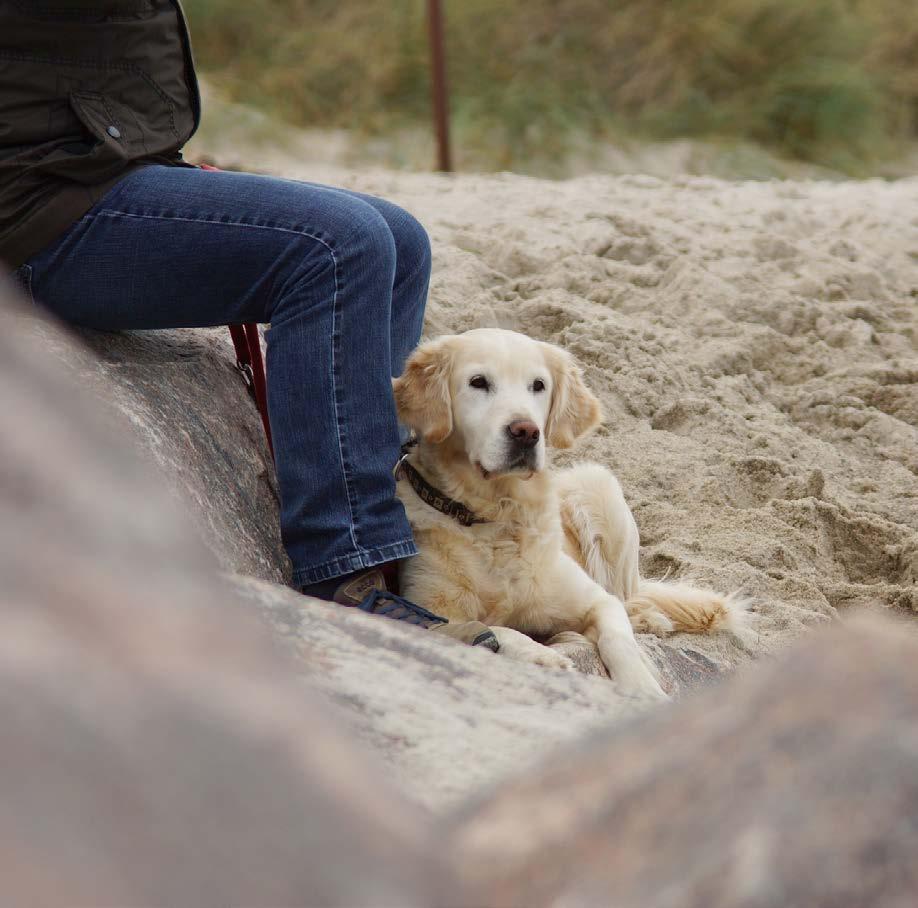
• Blinkered world: Insufficient efforts to address climate change and food production result in mixed outcomes for animals and people.
• One Planet: Major challenges are tackled in a way that protects animal wellbeing and nature. Animals speak up: A transformative event revolutionises attitudes towards animals.
While some scenarios may seem bleak, Sherwood points out that there are also





opportunities on the horizon. “Lab-grown meat has recently been licenced for pet food in the UK; scientists are using AI to decode animal communication; and we are growing organs on microchips to replace animal testing,” he notes.
The online experience is based on a groundbreaking report commissioned by the RSPCA, analysing scientific evidence, emerging trends, and stakeholder interviews[1].
It marks the first step in the Animal Futures project, with users invited to sign up for a

national consultation on animal welfare attitudes later this year.
Sherwood concludes, “We want to invite everyone across Mid and West Wales to explore Animal Futures and find out how the choices they make today could build a better world for animals – and us –tomorrow”.
Those interested can visit rspca.org.uk/animalfutures to experience Animal Futures or sign up to have their say on creating a better world for all animals.











WALES should follow example of Western Australia in attracting doctors and nurses, says a local MP
Plaid Cymru MP for Ceredigion Preseli, Ben Lake, has said that Wales should follow the lead of regions like Western Australia in attracting workers to fill skill shortages in public services through promotional campaigns.
He warned that rural depopulation in Wales could lead to a “collapse of public services” without government intervention to retain young people in rural areas and attract workers from other parts of the world.
Western Australia launched a campaign last year targeting workers in the UK and Ireland, enticing them with promises of higher salaries, a better quality of life, and lower living costs. WA government minister Paul Papalia declared in the promotion, “We are here to steal your workers by offering them a better life in one of the most beautiful places on the planet.”
Ben Lake MP highlighted the “many benefits of rural living” in Wales and urged both the Welsh and UK governments to do more to attract key workers to rural communities. He noted that Ceredigion recorded a 5.9% decrease in its population in the last census, while Pembrokeshire’s population remained stagnant. The constituency is experiencing the “real consequences of depopulation,” including a shortage of GPs, the absence of NHS dental services in much of the region, school closures, and the lack of banking facilities.
Rural Wales will face a “collapse of public services” unless the Welsh Government, together with the UK Government, which holds all powers relating to immigration in
Wales, take action to help attract workers.
Speaking in Westminster this week, Ben Lake MP said: “I represent Ceredigion Preseli. At the last census, Ceredigion—the majority of my constituency—recorded a 5.9% decrease in its overall population, and the communities in Preseli or Pembrokeshire that I now represent saw their population flatline. This is a problem that we are very much living with today. What does it mean? In practice, it means that we are having very difficult discussions about, for example, the provision of public services and whether the school estate is sustainable for the future. We are talking about the lack of GPs and the fact that we do not have an NHS dentist any more in much of the constituency. There are three well-known banks in the UK that no longer have a single branch in the two counties that I represent. This is the real consequence of depopulation.
He continued: “This is something that the UK Government can help with, and it should be on their radar. When the Cabinet Office looks at the range of risks it must monitor as part of its remit—something that the Public Accounts Committee discussed in the previous Parliament—it should look at how the discrepancies in demographic trends across these islands might have an impact on key public services, because in certain areas of rural Wales we will, I am afraid, see a collapse of public services. That will have a knock-on impact on more urban areas, which are themselves struggling with different demographic pressures.
“This is an important debate, and I would ask the Home Office Minister to consider, as part of her important work in this new Parliament, the lessons to be drawn from
experiences across the world. My hon. Friend the Member for Perth and Kinrossshire (Pete Wishart, SNP) mentioned the experience of Quebec. As west Walians, we often turn on the radio to hear adverts from the Government of Western Australia trying to attract many of our young doctors and nurses to migrate to that part of the world. Are there incentives we could use to persuade more of our young people to stay or to attract those from other parts of the world? There are many benefits to rural living. Perhaps we could be more creative in grasping this problem by the scruff of the neck, because I fear we do not have much time left to deal with it.”



Making the most of water in farming is key to keeping food supply sustainable and protecting the environment. By using water wisely and precisely instead of overapplying it, farmland owners can stop soil from wearing away and grow more crops, helping to meet the rising need for food around the world.
This is where remote agriculture monitoring solutions are needed. Satellites provide farmers with realtime insights into soil moisture levels, crop health monitoring, and weather conditions, enabling precise irrigation strategies. Such a far-from-traditional approach not only conserves water but also boosts agricultural productivity. Farm monitoring software can continuously monitor soil moisture levels and make farming more efficient and resilient, securing future food supplies while minimizing water waste. By leveraging satellite technology for remote soil moisture monitoring, farming can become more efficient and resilient, securing future food supplies while minimizing water waste.

In agriculture, soil moisture analytics of the field helps to manage water efficiently for sustainable farming. Therefore, crops get the right level of water. Good management increases crop production by allowing the correct level of water to be applied on the crops and stopping the stresses on the plants due to low or high water levels, making
them stressed or washing out some nutrients useful for growth. By tapping into advanced satellite soil moisture analytics, farmers are empowered to make data-driven decisions leading to healthier plants and productive harvests.
Beyond returns, efficient water use continues to be sustainable considering that it makes sure the availability of water resources is conserved and also that the soil remains fertile and productive for future planting seasons. Proper water
management also takes care of environmental conservation: it ensures that ecosystems are not destroyed and that biodiversity is maintained, mitigating the effects of climate change. For example, lesser instances of water wastage and runoff protect local rivers and lakes from the destruction of habitat for wildlife.
In essence, efficient water resource management, underpinned by smart soil moisture analytics, is about more than just growing crops — it’s about nurturing a sustainable future. By optimizing water use, we ensure abundant harvests, safeguard our environment, and build resilient agricultural systems for the years to come.
Irrigated agriculture today accounts for a staggering 70% of all freshwater withdrawals globally. However, not all of this water nourishes crops. In traditional systems, over 50% often returns to rivers or groundwater, unused by plants. This return flow, while reusable downstream, highlights inefficiencies in water use.
Monitoring water productivity in agriculture — how much crop is produced per unit of water — is essential for improving these efficiencies. Advancements in earth observation technology, particularly monitoring soil moisture using remote sensing, now make it possible to track critical data for sustainable agricultural practices and natural resource management.
Evapotranspiration, which encompasses both soil evaporation and plant transpiration, can be measured via satellites. Similarly, plant growth and health are accessible through this technology. By increasing crop biomass or reducing water usage, we can enhance water productivity. This progress is vital for ensuring sustainable water use in agriculture and securing food supplies for an ever-growing population.
The application of remote sensing in soil moisture management has already proven its effectiveness through different cases. Let’s discuss some of them.
In Australia, the MurrayDarling Basin is a critical agricultural region where water scarcity is a persistent challenge. By utilizing satellite data to monitor soil moisture and evapotranspiration, farmers have been able to optimize irrigation schedules. This has resulted in a 20% increase in water use efficiency, reducing overall water consumption while maintaining crop yields. The benefits include enhanced water conservation and improved crop productivity, ensuring the region’s agricultural sustainability.
In California’s Central Valley, satellite data has been used to monitor crop health and soil moisture. This information allows farmers to implement precision irrigation, targeting only the areas that need water. As a result, water usage has decreased by 30%, and crop yields have increased by 15%. The implementation of these technologies has led to significant water savings and improved agricultural output, demonstrating the power of satellite data in modern farming practices.
Primo Principio, an Italybased company, has made strides in improving vineyard management using the EOSDA Crop Monitoring platform. Grapes, a particularly demanding crop, require meticulous irrigation and disease prevention efforts. In Italy, where weather patterns are unpredictable, Primo Principio’s model has helped farmers receive timely alerts about water and disease stress in their fields, aiding in irrigation and crop treatment decisions.
However, the need for a more precise approach led Primo Principio to adopt EOSDA Crop Monitoring. This platform provides detailed soil moisture maps and other critical data, enabling early detection of plant stress and more accurate irrigation and treatment processes.
With EOSDA Crop Monitoring, Primo Principio has enhanced its model to deliver geo-specific information, pinpointing areas within fields experiencing issues such as pests or extreme weather. This precision is
crucial for effective irrigation and disease prevention. The integration of Variable Rate Application (VRA) maps, which include vegetation indices like NDVI and NDMI, has further refined their approach, allowing for precise liquid spraying and treatment applications.
Since May 2023, Primo Principio has been using EOSDA Crop Monitoring, receiving positive feedback from their clients. Approximately 30 clients, managing fields ranging from 0.17 to 104 hectares, now benefit from the platform. Weekly or biweekly reports featuring multilayered maps provide detailed insights into vegetation and moisture levels, helping farmers make informed decisions. This innovative approach has empowered farmers to apply treatments and irrigation more precisely, enhancing water productivity and sustainability in Italian vineyards.
It is with satellite-based remote sensing that the efforts towards the study of peatlands have been revolutionized, providing a huge extent of detailed views over such complex ecosystems. Due to the wide coverage characteristic of satellite-based remote sensing, together with cost-effectiveness and seasonal and spatial variation capture, it is unrivaled for peatland mapping, vegetation monitoring, and estimation of carbon stocks.
However, challenges remain regarding the enhancement of in situ calibration and validation, local factor integration, and detailed in situ data. This demands that the right vegetation indices, spectral bands, and processing techniques are utilized to ensure effective crop monitoring.
There are, however, lingering problems in classifying accuracies, penetration into vegetation, and quantification below ground. Improvement in technology is required to integrate data from multiple sensors, with better algorithms, and validation on the ground with site-specific makes consideration.
In this regard, the upcoming hyperspectral satellite missions like EnMAP, PRISMA, and CHIME hold great promise for peatland monitoring. These datasets can enable specieslevel analysis, but precise measurement of key plant spectral properties is essential to unlock their full potential.

AUTUMN can certainly be felt in the evenings these past few nights with amazing sunsets, darkness encroaching earlier and a certain chillier feel in the air. Following the wind and rain of the past week there are also plenty of acorns and leaves crunching under foot as we go about our work on the farm.
Whatever the weather, the FUW team has seen a busy week, with farm visits, briefings and county meetings in the offing. Delegates visited the US embassy in London last week to discuss a number of issues facing our farmers. It was great to secure a meeting with influential individuals at the US Embassy to discuss Welsh agriculture. Wool and leather was one topic of conversation and seeing if we could share ideas of better ways to promote Welsh wool and developing markets similar to those for leather in America. Naturally Welsh lamb markets were also high on the agenda and any potential inroads into the US were discussed. Renewable energy was another agenda item, and of course, any new trade opportunities for Welsh agriculture following the US elections. It was interesting to learn about The US Agricultural Extension Scheme which brings together farmers, researchers and governments to work as one. Could we implement a similar scheme in the UK for agricultural innovation?
We are, as always, so grateful to our farming family members for facilitating visits to their farms. With so many new politicians walking Westminster’s corridors now, we are keen to bring them to our farms to see for themselves, at grassroot level, what is affecting our farmers day to day lives. There’s no better way to engage people than seeing our farmland in the open air whilst appreciating some of our wonderful countryside which is maintained by our
farming way of life. It’s true to say that not all politicians are used to animals, muck, silage, slurry, grass and livestock sheds, but it is the working office that faces our food producers every day.
One recent such visit was to the Davies family dairy farm at Holywell, a county council dairy holding in north east Wales. Becky Gittins, the newly elected MP for Clwyd East attended with us and met with the farmers, Dei and Heulwen Davies and their son, Rhys. They farm 100 acres at Moor Farm, Holywell, with the council tenancy run on a 15 year agreement on 73 of those acres. A further 100 acres is temporarily rented land for silage and grazing. The family run 120 milking cows at Moor Farm, with around 80 young stock on a spring calving system. Dei is a recent former Chair of the FUW’s Milk and Dairy Produce Committee and we’ve gained much from the experience of farmers like Dei whilst bringing in the next generation of farmers to our committees. He has worked tirelessly over the years on behalf of the dairy industry and is a keen ambassador willing to share information with the public. That is one reason we were keen for Dei to meet MP Becky Gittins, and offer some insight to the industry.
Alun Owen, our FUW Regional Vice President for North Wales hosted another visit at Gallt-yCelyn, Pentrefoelas with his wife Marian and son Siôn. A very different farm to Moor Farm, Gallt-y -Celyn is an upland farm producing store cattle and fat lambs on the Foelas estate in the Uwchaled area within Conwy county. Alun had invited Claire Hughes, Bangor Aberconwy MP to the farmyard to offer some first hand insight to the industry as a whole and the event was a great success. We’re hopeful that both Becky and Claire left the farms better informed and more willing to represent the issues that matter to our members on the green benches of Westminster.


Renault is offering customers three years’ free servicing on selected models from its award-winning range of electrified family-friendly SUVs as part of its September Event.
Retail customers placing an order for a new Symbioz E-Tech full hybrid, Austral E-Tech full hybrid or Scenic E-Tech 100% electric between September 13th and 23rd via a four-year or two-year Personal Contract Purchase (PCP) or four-year Hire Purchase (HP) deal will automatically receive a free service plan that covers the cost of all routine servicing for the first three years.
The free service plan, worth up to £396, represents a saving of up to £600 when compared to the cost of booking each service annually, and offers customers inflation-proof peace of mind and predictable running costs.
Combined with Renault’s competitive finance offers – which include a two-year 0% APR1 PCP on all models in the range, 4.9% APR representative2 on Austral E-Tech full hybrid and Scenic E-Tech 100% electric, and 6.9% APR representative3 on Symbioz E-Tech full hybrid –there’s never been a better time for customers to get behind the wheel of a new 74-plate Renault, while enjoying even lower cost of ownership.
The Symbioz E-Tech full

hybrid embodies the best of Renault’s latest C-segment vehicles in terms of modular design, connectivity and efficiency. It has all the qualities necessary to appeal to families looking for a level of electrification, while keeping a firm hold on running costs. Weighing in at less than 1,500 kg and equipped with an innovative full hybrid powertrain, Symbioz has emissions from only 105 g/ km of CO2 and delivers up to 60.1 mpg.
A highly connected and innovative SUV for the modern, electrified world, the Austral E-Tech full hybrid marries its bold,
sporty SUV design and efficient drivetrain with an innovative, contoured cockpit and a range of advanced technologies.
Powered by a 200hp petrol hybrid powertrain with a 400V 1.7kWh lithium-ion battery, it offers an electric-only mode for quiet and zero emissions driving, while the battery recharges when decelerating and braking to deliver a truly electric experience with no need to plug in.
Designed to combine all that a family needs to travel freely and safely with a focus on sustainability, the Renault Scenic E-Tech 100% electric features a compact motor (with
170hp or 220hp) and a choice of 60kWh or 87kWh battery packs for an all-electric range of up to 379 miles. The long wheelbase ensures an exceptionally spacious cabin yet is lighter and more compact than the average C-segment vehicle. Its pioneering Solarbay opacifying glass roof and ingenious rear armrest – including storage for devices, screen stands and cup holders – create an inviting, comfortable and practical space for families.
The September Event runs from Friday 13th to Monday 23rd at Renault retailers.























PLANS to enshrine international human rights treaties into Welsh law will no longer be brought forward by 2026 despite a manifesto commitment, a committee heard.
Labour’s 2021 Senedd manifesto pledged to incorporate United Nations conventions on rights of disabled people and the elimination of discrimination against women.
But the Senedd’s equality and social justice committee was told the Welsh Government will not introduce legislation on the UN treaties before the election in May 2026.
Simon Hoffman, a professor in law at Swansea University who specialises in human rights, led 2021 research on advancing equality and human rights in Wales.
In his written evidence to the inquiry, Prof Hoffman said preparatory work will not be complete in time for legislation to be brought forward during the current Senedd term.
He told the meeting: “I don’t think we can achieve what was in the recommendation…. I think the best we can think about is possibly a green paper and a timeline.”
Witnesses warned a lack of time and money has harmed efforts to incorporate UN treaties.
Charles Whitmore, a research associate at Cardiff University’s Wales Governance Centre, chairs a working group that is exploring the legislative options.
He told the committee: “We do not have any financial resource so far made available to pay for time to do the work, so invariably it proceeds at a pace that matches voluntary capacity.”
Cautioning that incorporation could be “quite far away”, Mr Whitmore said: “I don’t know if we’re at the stage of being able to put a timeframe against this yet.”
Jenny Rathbone, who chairs the equality committee, raised concern about delays, criticising the previous UK Government’s “schizophrenic attitude” towards human rights.
“Time marches on and we’re only 18 months away from wrapping up this term,” she said.
Her Labour colleague Julie Morgan questioned whether there has been a shift in view from Welsh ministers, asking witnesses if incorporation still holds value.
Sioned Williams, Plaid Cymru’s shadow social justice secretary, similarly asked

whether there has been any cooling of enthusiasm towards enshrining rights.
And Joel James, her Conservative counterpart, contrasted “warm words” from ministers with an “implementation gap” on the ground.
Mr Whitmore agreed about the need to protect against “regression” in human rights at a UK level, saying the “alarming” pace of legislation drained capacity and hampered work.
Prof Hoffman, who is secretary of the Senedd’s crossparty group on human rights, said incorporation should remain firmly on the agenda.
“Legal recognition of rights is a significant step,” he told committee members.
Prof Hoffman said incorporation of rights would raise awareness, signal importance, influence policy development and provide for accountability.
He added: “One of the things that incorporation does is it makes human rights enduring … it makes human rights sticky … and I think that is particularly important.”
Prof Hoffman pointed out that Wales’ 2011 Rights of Children and Young Persons Measure places a duty on ministers to have “due regard” to the UN
convention on children’s rights.
The expert cautioned that spreading resources too thinly could force a binary choice.
He said: “I think it’s crucially important that we continue on the route towards incorporation while also looking at other ways of doing human rights in practice.”
Prof Hoffman suggested the UK Government’s decision to challenge Scotland’s children’s rights legislation in the Supreme Court has had a chilling effect on work in Wales.
Meanwhile, Mr Whitmore cautioned that the sector is under considerable pressure as he raised the example of the ripple effect caused by the closure of the Chwarae Teg charity.
Sarah Nason, a senior lecturer in administrative law at Bangor University, said public bodies are already subject to many duties and any new ones need to be aligned.
“It’s a question of the duties being clear and consistent,” she said.
Calling for reforms to improve access to justice, Dr Nason raised concerns about cuts to legal aid creating “advice deserts” across the country.
She told the meeting on September 16 that Wales sees “very few” judicial review claims
per head of population compared with parts of England and other devolved nations.
The Equality and Human Rights Commission (EHRC) painted a mixed picture in its 2023 ‘state of the nation’ report, entitled Is Wales Fairer?.
Warning poverty remains a persistent problem in Wales, the EHRC raised concerns about one-in-four children living in relative income poverty.
The commission also found educational attainment for disabled children in Wales is falling behind other parts of the UK as is the attainment gap for those eligible for free school meals.
And, according to the report, the number of racially and religiously aggravated offences rose 72% from 2017 to 2022 while the number of offences resulting in a charge fell.
Making a total of 19 recommendations to the Welsh Government and other public bodies, the commission called for action to tackle gaps in data and evidence.
But the EHRC welcomed ministers’ commitments and highlighted progress on diversity in public appointments as well as a narrowing of gender pay and disability employment gaps
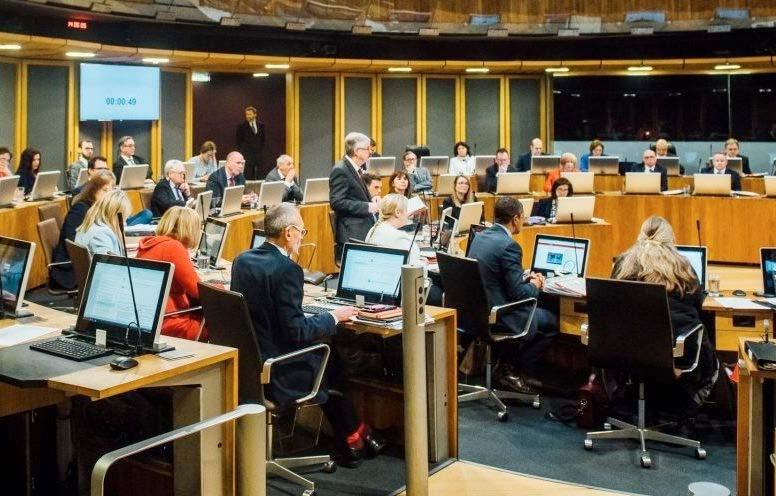
THE Welsh Conservatives have forced a vote in the Senedd, urging the UK Government to reverse its decision to end universal winter fuel payments. This move comes amidst growing concern that the UK Labour Government’s policy change will have a severe impact on pensioners across Wales. Approximately 400,000 Welsh households, including 540,000 pensioners, are expected to miss out on payments of up to £300 this winter.
Jane Hutt MS, the Welsh Government’s Cabinet Secretary for Social Justice, Culture, Trefnydd, and Chief Whip, outlined the potential consequences of this decision in response to a written question by Welsh Conservative Leader, Andrew RT Davies MS. Hutt emphasised that the withdrawal of the universal winter fuel payments could push some pensioners into fuel poverty, raising alarms about the wellbeing of Wales’ elderly population.
In the Senedd session on 18th July 2024, the Welsh Conservatives tabled a motion calling on the UK Government to reconsider its stance on the universal winter fuel payment.
Welsh Labour Members of the Senedd (MSs) are set to vote on this motion, which could determine whether the payment scheme will be reinstated.
Ahead of the debate,
Andrew RT Davies MS, Leader of the Welsh Conservatives, urged Labour MSs to prioritise the interests of their constituents over party allegiance. “This debate is a chance for Labour MSs to show that they have the courage to put their constituents’ interests before their party interests,” Davies stated. “The Welsh Conservatives will not stop fighting to keep pensioners warm this winter.”
Joel James MS, the Welsh Conservative Shadow Minister for Social Partnership and Social Justice, echoed these sentiments, condemning the decision to scrap winter fuel payments. “Labour’s shameful decision to scrap winter fuel payments risks creating a fuel poverty crisis among pensioners in Wales,” he said. “In the Senedd this week, I look forward to bringing forward our Welsh Conservative debate calling on the UK Government to reverse their decision to end the universal winter fuel payment.”
The decision to cut winter fuel payments has also drawn criticism from Age Cymru. Chief Executive Victoria Lloyd expressed concern about the impact on vulnerable pensioners. “Age Cymru firmly believe that cutting the winter fuel payment this winter, with virtually no notice and no compensatory measures to protect poor and vulnerable pensioners, is the wrong
WITH SAMUEL KURTz
WE have been fortunate to enjoy some lovely sunny weather over the summer months. Seeing visitors and locals spending time in Pembrokeshire, appreciating some of the finest towns, beaches, coastlines, and countryside the UK has to offer, all bathed in sunshine, brings me great joy.
may be between heating and eating.
decision,” Lloyd stated. “People have been sharing with us how they’ll struggle this winter without the winter fuel payment. We have heard from people who have long-term health conditions who need to have a warm home and will need to cut back on food to ensure that their homes are warm.”
The motion submitted by the Welsh Conservatives reads:
• To propose that the Senedd:
• Expresses deep concern that around 400,000 households in Wales will lose up to £300 per person after the UK Government’s decision to end the universal Winter Fuel Payment.
• Notes the Welsh Government’s Cabinet Secretary for Culture and Social Justice, Trefnydd and Chief Whip’s response to WQ93698 where she stated that the UK Government’s decision to end the Winter Fuel Payment will risk pushing some pensioners into fuel poverty.
• Calls on the UK Government to reverse their decision to end the universal Winter Fuel Payment.
The outcome of this vote could significantly affect the financial stability and wellbeing of Welsh pensioners this winter.
During the summer recess from the Senedd, I have been out and about in the constituency, visiting local businesses and organisations, and attending several agricultural shows, with the highlight being the Pembrokeshire County Show in mid-August. I spoke with hundreds of people, and it was interesting to hear what was on their minds.
Following a gruelling General Election campaign that dominated June and early July, it will not surprise you to learn that politics was not the main topic of conversation during the summer recess. However, one political decision made by the new Labour Government, and supported by the new Labour MP for Mid and South Pembrokeshire, has caused considerable upset and concern..
The issue, of course, is the heartless decision to cut the annual Winter Fuel Payment for pensioners not receiving state benefits.
To put this into context, around 21,000 pensioners across the Mid and South Pembrokeshire constituency stand to lose up to £300 each this winter.
While the most vulnerable pensioners, those receiving pension benefits, will not be affected, those surviving just above the threshold for benefits will be hit hard.
For many of these pensioners, the choice
Like many others, I see this decision as unnecessary and cruel. The Labour Government will, on the one hand, argue that savings need to be made, while on the other, they are throwing money around in response to demands from their Trade Union backers for unreasonable and unsustainable pay increases: Junior Doctors in England (22% over 2 years) and Train Drivers (15% over 3 years), to name just two.
The absence of any impact report on the harm this cut will cause demonstrates how concerned both the UK and Welsh Labour Governments are about the consequences of this decision.
Do not be fooled by the latest Labour First Minister in the Senedd into thinking that Labour in Wales is any different. They are fully supportive of the choices the Prime Minister has made and will continue to deflect blame from themselves.
My concern is that this cut to Winter Fuel Payments is only the first of several cuts to be introduced in the coming weeks, which is why it is vital that we are vocal in our opposition.
Although winter is still a few months away, it is important that we continue to highlight this issue. Older people will struggle to heat their homes this winter, and Labour politicians continue to support stripping this vital support from pensioners.
If you are concerned about affording your heating this winter, I urge you to contact your energy company to explore what support may be available to help spread your costs. My constituency office will also have details of organisations that may be able to offer assistance.

W ITH ANDREW LyE
Last week’s headlines covered several major issues. The vote to cut the Winter Fuel Allowance was passed by the Commons. Our new MP, Labour’s Henry Tufnell supported the Government. The issue has upset everyone you can think of and it’s an issue that will be remembered for years to come. Tufnell got just over one-third of the vote at the General Election, so Mid & South Pembrokeshire cannot be thought of as a safe Labour seat. The Winter Fuel Allowance debate is one that is not likely to go away, soon.
The damage left by the Conservatives to our economy is unforgivable but cutting payments to vulnerable pensioners is no way to bring about the change the country deserves. Liberal Democrat MPs proudly opposed the Government’s proposal and stood up for the many pensioners across the country who are now at risk of an even bigger winter cost of living crisis.
The Liberal Democrats fought against this cut and will continue to be a constructive opposition to the new Government and we’re fighting for the real change people want to see.
We have seen our prisons to be full to the rafters with less than 100 spare spaces and there was talk of prisoners being sent to serve their sentences in Estonia, and the courts were being asked to delay sentencing if it was likely to involve a custodial sentence.
And on Thursday, we had the huge news story following the publication of Lord Darzai’s independent damning report into the NHS in England. PM Sir Keir Starmer said the NHS in England was broken, but not beaten and that it must reform or die. There would be no extra money without reform. OK, that relates to England and Lord Darzai did not look at the NHS here
in Wales. But you would be unlikely to find anyone who would say that the NHS in Wales is any different to England and would have similar problems. Here, the NHS is in the hands of the Welsh Labour Government in the Senedd and the Minister of Health until recently was none other than the new First Minister, Eluned Morgan.
The new Health Secretary, Jeremy Miles is going to be kept busy.
Responding to the Darzi report, Liberal Democrat Leader Ed Davey said:
“This report shows the NHS (in England) is on its knees after years of the Conservatives driving local health services into the ground.
“Patients are suffering on endless waiting lists, struggling to access the care they desperately need.
“Fixing the NHS is this country’s greatest challenge and the new government must make it their top priority. That must include recruiting more GPs, fixing our crumbling hospitals and crucially tackling the social care crisis that has been ignored for far too long.”
Commenting on the Prime Minister’s speech on the state of the NHS, Liberal Democrat Health and Social Care spokesperson Daisy Cooper MP said:
“The damage that the former Conservative Government has caused to our NHS & social care system is unforgivable and today’s Darzi Report is a scathing and sobering reminder of this.
“The Liberal Democrats have long called for reformmoving healthcare from hospitals to home, and from treatment to prevention. Moreover, the elephant in the room is that we cannot reform our NHS without reforming social care, and the Liberal Democrats will continue to push the Government to take up our plans to fix not just our NHS but the social care system too.”
If you have any issues or comments, please contact me at andrew.lye@pembslibdems.wales

CONCERNS over ambulance services in Pembrokeshire have escalated, with local politician Paul Davies MS raising critical questions in the Senedd today, demanding urgent reassurances from the Welsh Government.
The issue comes in the wake of several distressing incidents, including the recent death of a man after a nine-hour wait for an ambulance in Pembroke Dock.
In a statement posted on his Facebook page, Mr Davies expressed his alarm following numerous complaints from local residents. He said: “I’ve called for a statement from the Welsh Government on the delivery of ambulance services, following local concerns that I’ve received. Reassurances must be given that beds will not be removed from Withybush Hospital, as the removal of beds will only add further strain to the system. Support is also needed as a matter of urgency, as staff feel that they’re facing more and more paperwork and targets.”
The Conservative Senedd Member also highlighted that ambulance staff are increasingly struggling under heavy pressure, with added paperwork and challenging targets contributing to low morale. He raised the matter in the Senedd chamber, calling on the new Cabinet Secretary for Health and Social Care to make an urgent statement.
The demand for action follows a number of recent tragedies in the area linked to delayed ambulance response times. The case of David Bye, who died after a nine-hour wait for an ambulance in Pembroke Dock, has shocked local residents, who are now vocal in their demands for improved healthcare services across Pembrokeshire. Mr Bye’s death, along with other similar incidents, has intensified the public outcry for improvements to the region’s emergency response system.
The Welsh Ambulance Service has cited broader system-wide pressures, including long delays in transferring patients into hospitals, as a key cause of
slow ambulance response times. However, residents and staff alike have expressed fears that removing beds from hospitals like Withybush will only exacerbate the problem.
Mr Davies has warned that without immediate intervention, the already stretched healthcare system in Pembrokeshire could deteriorate further, with severe consequences for patients and medical staff alike.
In his closing remarks in the Senedd, Mr Davies reiterated the urgency of the situation: “In light of the seriousness of the concerns raised, I believe that we need a statement now from the new Cabinet Secretary for Health and Social Care to address some of these concerns as soon as possible.”
The Pembrokeshire community will be watching closely to see if the Welsh Government responds with decisive action to ensure that local ambulance services and hospitals are properly supported, and that no more lives are lost due to delays in care.
A PRE-APPLICATION
consultation on plans to build 35 affordable homes on the site of the former Cleddau Bridge Hotel, Pembroke Dock is to be launched next week.
In a prime location at one of the entrances to Pembroke Dock the former Cleddau Bridge Hotel has been derelict since a fire in March 2019, which brought emergency services from as far afield as Ammanford, Aberystwyth and Swansea.
A previous planning application for the demolition of the hotel and siting of a residential care home and linked bungalows was submitted in October 2022 and which was subsequently granted permission in February 2023.
This permission, whilst in outline, is still live and allows for the loss of the hotel use of the site and its alternative redevelopment as a residential care home.
The site has now been purchased by Castell Group Property Specialists who specialise in delivering affordable housing in South Wales and have undertaken a joint development deal with Pembrokeshire County Council (PCC) and that deal was agreed back in April 2024.
Castell Group Property Specialists, through agent Hayston Developments &

Bruce Sinclair Local Democracy Reporter
Planning Ltd, now wants to demolish what is left of the hotel, with a development of twostorey affordable housing units, with landscaping and ecological enhancements, the housing being 100 per cent affordable, in a mix of a mix of social rent and affordable housing.
Initial discussions with the council were for 38 affordable units, which has been lowered to 35 in a mix of 16 x 1 bed units, 11 x 2-bed units, 6 x 3-bed units and 2 x 4 bed units.
Anyone who wishes to make representations about this proposed development

“Labour’s time is up - Wales needs a fresh start with Plaid Cymru” says party leader Rhun ap Iorwerth
Plaid Cymru Leader Rhun ap Iorwerth outlines priorities ahead of start of new Senedd term
Wales needs a “fresh start” from Labour, Plaid Cymru Leader Rhun ap Iorwerth has said.
must do so by the October 18, the formal consultation period commencing on September 18.
Details may b viewed here. Responses should be emailed or posted to Hayston Development & Planning Ltd, Planning Studio, Hayston Bridge, Johnston, Haverfordwest, Pembrokeshire, SA62 3HJ.
A formal application to Pembrokeshire County Council will follow the pre-consultation.
Mid and West Wales Fire and Rescue Service has previously said the 2019 fire was started by a deliberate act.
Following a fire investigation, Dyfed-Powys Police said they found there to be insufficient evidence to identify a suspect.
FOUR candidates have put themselves forward in The Havens by-election, called following the sad death of County Councillor Peter Morgan.
Nominations have closed and the Statement of Persons Nominated published.
Those standing for election are: Jony Griff (Independent); Mike Harris (Independent); Thomas James Hughes (Welsh Liberal Democrats) and Nick Neumann (Welsh Conservative Party).
The election will be held on Thursday, 10th October.
Applications to register to vote (opens in a new tab) must reach the Electoral Registration Officer by12 midnight on the 24th September.

Alterations to existing arrangements for postal voting by electors or their proxies who already have an indefinite or fixed period postal vote, or new postal vote applications (opens in a new tab), must reach the Electoral Registration Officer by no later than 5pm on the 2nd September.
Applications to vote by proxy
(opens in a new tab) must reach Electoral Registration Officer by no later than 5pm on the 25th September.
Poll Cards will be sent to electors before the election which will indicate which polling station to vote at.
Mr ap Iorwerth was speaking ahead of a press conference today (09.30 am, Tuesday 17 September) at the start of the new Senedd term.
He will also be challenging Eluned Morgan in her first First Minister’s Questions later (1.30pm).
The Plaid Cymru Leader will set out priorities on which he expects the First Minister to take action including: · a public reprimand to the Prime Minister for cutting Winter Fuel payments to pensioners and maintaining the twochild cap, and demanding to change those policies · setting out to the chancellor the impact that further austerity will have on public services and demanding a new and fair funding formula for Wales to replace Barnett · reforming the NHS to tackle waiting lists
Plaid Cymru Leader Rhun ap Iorwerth MS said that the legacy of successive Labour governments had “never been clearer” and called on the government to take action to tackle challenges facing the NHS, the economy and public services.
Mr ap Iorwerth said that Wales needed a “fresh start” and said only Plaid Cymru had the “ideas, energy, and ambition” to turn things around.
Plaid Cymru Leader Rhun ap Iorwerth MS said,
“As the Senedd returns from recess today, the legacy of 25 years of Labour in power in Wales has sadly never been
clearer.
“Record-high NHS waiting lists. A fall in educational standards in our schools. Wages lower than the UK average.
“After its winter of discontent and its summer of silence, we are in desperate need of an autumn of action from this Labour Welsh Government.
“This means holding the UK Labour government accountable by condemning Keir Starmer’s cut to Winter Fuel payments, affecting 400,000 Welsh households.
“It’s about putting country before party, demanding fairness from the Barnett Formula, HS2, and devolution of the Crown Estate and policing. And it means tackling root issues, like NHS reform to reduce waiting lists, rather than shifting blame without real change.
“Clear red water between Labour in Wales and Keir Starmer is in short supply and unless the First Minister is more vocal and acting with real intent in standing up to UK Labour government decisions which drive pensioners into poverty and public services into the ground, the well will be dry.
“Labour have had their chance at governing Wales – and it’s not working.
“Wales needs a new government. One that will stand up to Westminster to demand fairness. One that will invest in preventative healthcare. One that will be focused on attracting wealth, fostering new skills, raising wages, supporting small businesses, and encouraging students to build their futures here in Wales.
“Wales needs a fresh start and a new government with the ideas, energy and ambition needed to turn things around – and that government is Plaid Cymru.
SEnd yOUR LETTERS TO: THE EDITOR, 11 HAMILTON TERRACE, MILFORD HAVEN, PEMBROKESHIRE, SA73 3AL
EMAIL US AT: editor@herald.email

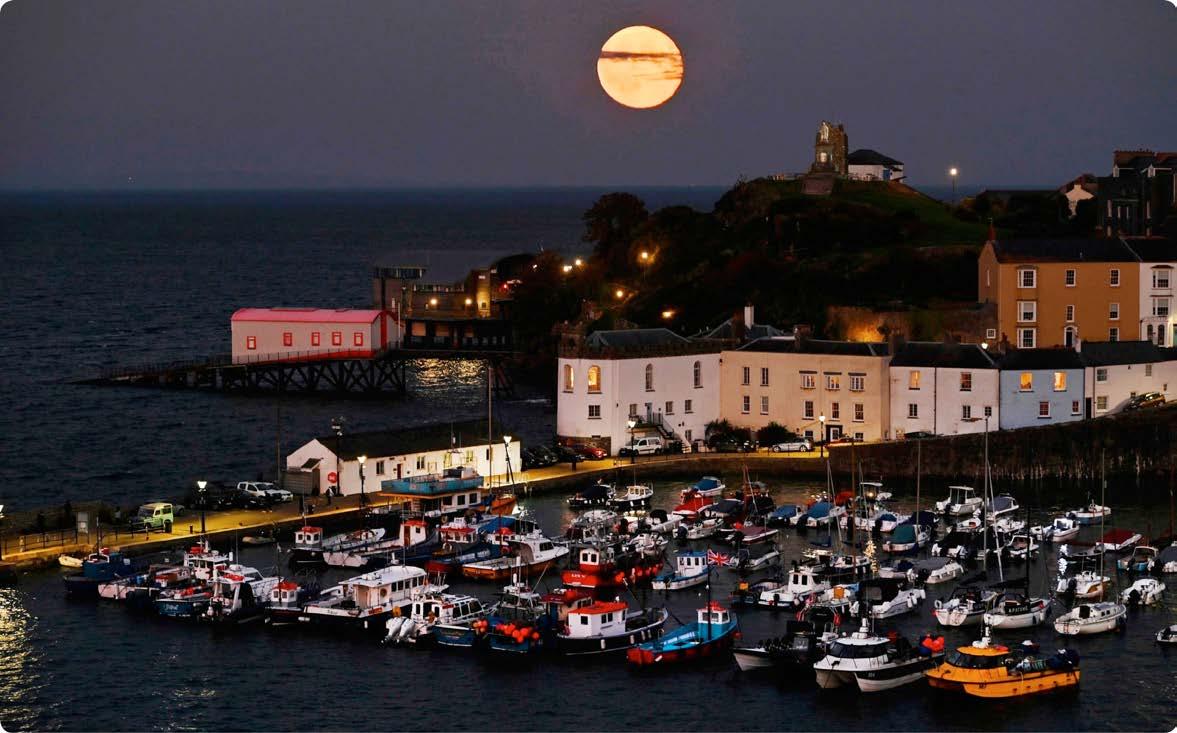
by GARETH DAVIES
GARETH DAVIES, the well known Pembrokeshire news photographer, has captured a stunning image of the Harvest Moon illuminating the skies over Tenby, showcasing the natural beauty of our coastal town. The Harvest Moon, traditionally the full moon closest to the autumn equinox, is renowned for its warm, golden hue and early rising. This celestial event historically signalled farmers to gather their crops, hence its name. As the sun sets, the moon rises in the
MOnEy TO FUnd LIFECHANGING BREAST CANCER RESEARCH
DEAR SIR
Breast Cancer Awareness Month is fast-approaching (October), which means the return of wear it pink - Breast Cancer Now’s biggest and brightest fundraising event on Friday 18 October.
Every 10 minutes, someone in the UK hears the words “you have breast cancer”. Sadly, this happened to my eldest sister Tracey. When she died in 2016, the news rippled through the family – shaking us all. Little did we know this was just the beginning of the long shadow breast cancer would cast over us.
In October 2020, I received my own diagnosis. Telling my younger sister Nikki was harder than I ever imagined. But when Nikki revealed months later that she’d also been diagnosed with breast cancer, I couldn’t believe it. Three sisters in one family!
While Tracey hadn’t lived to see
my diagnosis, I was here to see Nikki’s – and I was determined to support her through this.
Together we have come out the other side. Although we were both tested for the BRCA gene, it came back negative. The hospital told us that there probably was a genetic connection, but more research was needed to establish one.
This is why I’m calling on everyone to wear pink and raise money this October to help fund a life-saving research breakthrough that could help families like mine.
Support is just as vital. By wearing pink, you can help someone get reliable information and support when they need it most. Or drive forward vital campaigning, to make sure everyone living with breast cancer gets the best possible treatment and care.
However you decide to fundraise, you will be helping Breast Cancer Now to continue its world-class research and vital support.
So, on Friday 18 October, wear it pink, raise money and help create a future where everyone diagnosed with breast cancer lives, and is supported to live well. Sign up at
eastern sky, appearing larger and brighter than usual.
Gareth’s photograph beautifully encapsulates this magical moment, with the moon casting a silvery glow over Tenby’s picturesque landscape. The blend of the moonlight with
wearitpink.org/SignUp
Michelle Blackburn, who was diagnosed with breast cancer
Conservatives have never had Moral Principles, which explains why only Conservative Aristocrats and MPs voted for Black Slavery, until abolished by the Whig Party in 1833, by bribing Slave Owners, with 20 million of taxpayers’ money.
The Tory response has been to increase their lies about it, 200 years later, although historical truths must always remain, but the ignorant, the uneducated, the Populists, the vicious and the criminal, all fed by dishonest media, united behind Conservative Politicians, in 2019. Deliberate, gross Dishonesty was the bedrock of that Right Wing victory.
Those Conservative voters are angry now, at their own choice, but have learnt nothing, since they
the town’s historic buildings and the tranquil sea creates a breathtaking scene that captures the essence of autumn in Wales. As the nights grow longer, the Harvest Moon serves as a reminder of nature’s cycles and the changing seasons.
cannot blame themselves, any more than they did about Slavery. The extremist hatred in Conservative minds, has diverted from helpless slaves, to desperately vulnerable migrants, escaping from national economies which we destroyed. And that hatred consumes their minds’ ability to think rationally or with compassion. The grotesque delusion of their own personal superiority over slave and hopeful migrant, poisons their vision of humanity, and their own lives, contrasted to all other Political Parties.
Present levels of Education are insufficient to safeguard children developing in this self-centred society, for the reason that humans need moral beliefs, intrinsic in sympathetic voters, to guide our nation. Can you imagine the influence of growing up in families with criminal parents so consumed by hatred that they set fire to hotels containing foreigners who are eager to work? Can we compensate at all, for such a childhood?


PRICE Tom Begelly The death occurred peacefully at home with his family on Wednesday 4th September 2024 of Mr. Thomas John Price, affectionately known as Tom, aged 93 years of Begelly Farm, Begelly. Devoted Wife of Brenda. Much loved Dad to Gareth and Sian and Fatherin-law to Fiona and Simon. Treasured Taid to Megan, Ben & Sam and Great Taid to Florence. A dear Brother to Howard. The funeral service will take place on Monday 30th September 2024 at St. Mary’s Church, Begelly at 11:00am followed by cremation at Parc Gwyn Crematorium, Narberth at 12:15pm. There will be family flowers only with donations in lieu if desired for Cancer Research and The Paul Sartori Foundation c/o E.C. Thomas & Son Funeral Directors, Zoar Chapel Funeral Home, Llanteg, Narberth SA67 8QH (01834) 831876 & 21, Main Street, Pembroke SA71 4JS (01646) 682680 or via www.ecthomasandson. co.uk
JONES Gordonina Milford Haven It is with great sadness that the family of Mrs. Gordonina Jones, affectionately known as ‘Ina’ announces her passing, after a brief illness aged 90 years, formerly of Greenock, Scotland before living in Hakin, Milford Haven for the past 60 years. Ina passed away
peacefully on Friday 6th September 2024 at her daughter and son-inlaw’s home near Pembroke. Beloved Wife of the late Tony. Cherished Mother to Tanya and Mother-in-law to Bill. Much loved Grandmother to James, Chloe and her husband Fred. Loving great Grandmother to Annest. A private funeral service will take place. The funeral arrangements will be conducted by E.C. Thomas & Son Funeral Directors, Zoar Chapel Funeral Home, Llanteg, Narberth SA67 8QH (01834) 831876 & 21, Main Street, Pembroke SA71 4JS (01646) 682680
JAMES David Norton Cosheston The death occurred peacefully at his home on Wednesday 4th. September of Mr. David James of Westhaven, Cosheston. Devoted wife of Margaret and a much loved father, grandfather and great-grandfather, David was 86. Well respected in his role as a Building Control Officer, David will also be fondly remembered for all his work with The Maritime Heritage Society and all he did fostering links with The Japanese Society. The funeral will take place on Tuesday 8th. October with a service at St. Michael’s Church, Cosheston at 1.00.pm followed by cremation at Parc Gwyn Crematorium at 2.30.pm. Family flowers only please but if desired, donations in lieu in memory of David for The Paul Sartori Foundation and The Hub,
providing nursing and care at home, may be sent to John Roberts & Son, Funeral Directors, 51, Bush Street, Pembroke Dock, SA72 6AN, Tel. 01646 683115, who are carrying out the arrangements.
SKETT Graham Reginald Pembroke Dock The death occurred peacefully on Thursday, 29th August 2024 at Apley Lodge Care Home, Pembroke Dock of Mr. Graham Reginald Skett, aged 88 years formerly of Canterbury Road, Pembroke Dock. Dearly loved Graham will be sadly missed by all his family and friends. The funeral service will take place on Monday 23rd September 2024 at Parc Gwyn Crematorium, Narberth at 12.15pm. There will be family flowers only with donations in lieu if desired for Apley Lodge Care Home, Pembroke Dock c/o E.C. Thomas & Son Funeral Directors, Zoar Chapel Funeral Home, Llanteg, Narberth SA67 8QH (01834) 831876 & 21, Main Street, Pembroke SA71 4JS (01646) 682680
Sy LVIA B ELT
BELT Sylvia TEMPLETON The death occurred peacefully on Monday September 9th at Caldey Grange Care Home, Pentlepoir of Mrs. Sylvia Elizabeth Belt, aged 89 years formerly of Larkspur Close, Templeton. Sylvia will be sadly missed by Patricia, Susan, family and friends. The Funeral
service will take place on Saturday 21st September 2024 at Parc Gwyn Crematorium, Narberth at 10:45am. Should you wish to make a donation in memory of Sylvia for St John’s Church, Templeton. Please send donations to Nigel Rossiter, 6 Wesley Villas, Narberth SA67 7DS. The funeral arrangements will be carried out by E.C. Thomas & Son Funeral Directors, Zoar Chapel Funeral Home, Llanteg, Narberth SA67 8QH (01834) 831876 & 21, Main Street, Pembroke SA71 4JS (01646) 682680 or via www. ecthomasandson.co.uk
JAMES Roddy Peacefully following a short illness at Glangwili Hospital on Tuesday, September 3rd, 2024. William Roderick George James, Crannog, 60 Maesydderwen, Cardigan (previously of Neuaddwen, Feidrhenffordd), aged 87 years. Beloved husband of Pat, loving father of Susan, Sarah and Lloyd, father-inlaw to Emma and Andy, and dadcu to Ella, Thomas, Lewis, Ruby and Maddie, and brother to Val. Public funeral on Friday September 27th at 1130am at Parc Gwyn Crematorium, Narberth, followed by refreshments at Cardigan Golf Club, Gwbert-on-Sea. Private interment later. Family flowers only. Donations, if desired, to The DPJ Foundation, supporting those in agricultural and rural communities with mental health problems. www. thedpjfoundation.co.uk/support-us/






























PROFESSIONAL
























TOTTENHAM HOTSPUR manager
Ange Postecoglou has strongly criticised the abuse aimed at footballers on social media, while offering his support to Wales forward Brennan Johnson, who he believes will succeed at the club.
Johnson, 23, is reported to have deactivated his Instagram account following backlash after Spurs’ defeat to Arsenal in Sunday’s north London derby. The young forward, who joined Tottenham from Nottingham Forest in a deal worth over £45m last September, has scored five goals for the club but has faced criticism for inconsistent performances.
Postecoglou acknowledged that Johnson is “probably lacking a bit of confidence” but defended the player’s work ethic and dedication, expressing his dismay at the
level of online abuse directed at players.
“I hate how we’ve just normalised all that stuff,” Postecoglou said. “I’ve been around long enough and even when I was playing, I copped a fair bit. But it was usually on the terraces, and then the game was over and you’d go home.”
The Tottenham manager went on to highlight the toll this criticism has taken on Johnson. “You’re talking about a young guy who is probably lacking a bit of confidence at the moment. Things haven’t gone his way. But he comes here every day, works his backside off, asks for feedback, and does everything right. He’s trying so hard to become the player he wants to be. It’s hurting him a lot.”
Postecoglou also questioned the expectations placed on the player. “It’s not
like he’s out on the town and he doesn’t care, or he rolls up late. So what’s his crime? His crime is he isn’t performing at the level that people expect of him.”
Johnson, a product of Nottingham Forest’s academy, had a successful spell at his former club, scoring 29 goals in 108 appearances and quickly gaining recognition. However, since moving to Tottenham, the Nottingham-born player has struggled to find consistent form.
Postecoglou’s comments reflect his concern over the growing normalisation of online abuse towards players, and he emphasised the need for greater empathy, especially towards young footballers like Johnson, who are working hard to meet the high expectations placed upon them.
RYAN REYNOLDS AND ROB MCELHENNEY, the Hollywood actors behind Wrexham Football Club’s resurgence, are in discussions to invest in Welsh Fire, the Cardiff-based cricket franchise in The Hundred.
According to Glamorgan County Cricket Club’s chief executive, Dan Cherry, this could present a “huge opportunity” for cricket in Wales.
The talks with Reynolds and McElhenney are part of a broader initiative led by the England and Wales Cricket Board (ECB), which aims to sell 49% stakes in each of the eight franchises in The Hundred competition. The ECB hopes this initiative will generate around £500 million.
Glamorgan currently holds a 51% stake in Welsh Fire, and should the actors proceed with their investment, the county believes the global profile of the franchise

could be significantly enhanced, much like the transformation they’ve achieved with Wrexham Football Club.
Cherry expressed optimism about the
potential benefits of such an investment, telling BBC Sport Wales: “I think it’s a great opportunity financially for us to be able to invest back into the stadium here at Sophia Gardens, into the team at Glamorgan, and to build the game in Wales recreationally. It would also support the fantastic work that Cricket Wales, our partners, are doing.”He added that the involvement of Reynolds and McElhenney could help expand cricket’s reach in Wales. “It gives a huge opportunity for the game to expand its footing and grow. We’ve seen great crowds at The Hundred, especially family audiences, and I believe this could inspire the next generation of players to pick up a bat and ball.”
Reynolds and McElhenney’s involvement could not only provide a financial boost but also elevate Welsh cricket to a new level, following the successful example they’ve set with Wrexham.

Owen Pritchard’s stunning secondhalf strike secured a narrow victory for Penybont against Haverfordwest County at the SDM Glass Stadium on Tuesday evening.
Both teams made several changes for this third-round tie, but it was Penybont who edged through, booking their place in the next round of the Nathaniel MG Cup.
Haverfordwest County, despite creating some decent scoring opportunities, failed to find a way past Penybont’s experienced goalkeeper, Michael Lewis, who played a pivotal role in keeping a clean sheet. The visitors’ closest attempt came when Jacob Owen’s curling effort rattled the crossbar, leaving them frustrated.
The hosts also had their chances,
with Jasper Jones heading over from a good cross by Lewys Ware, and Bluebirds’ goalkeeper Ifan Knott pulling off a fine save to deny Pritchard at close range, ensuring the score remained goalless at half-time.
However, in the 53rd minute, Pritchard struck a superb long-range shot, which proved to be the decisive goal, leaving Knott with no chance.
Both teams made use of their substitutes as Penybont looked to protect their lead, while Haverfordwest will be disappointed to exit the competition without managing to score. This defeat marks the Bluebirds’ third narrow loss in a row.
Haverfordwest County will now turn their attention to the JD Cymru Premier, as they aim to get back to winning ways when they travel to face Aberystwyth Town at Park Avenue this Friday evening.
Clarbeston Rd 5 – Monkton Swifts 4
Late Goal Drama Secures Stunning Comeback Victory
Clarbeston Road staged a remarkable comeback to snatch victory from Monkton Swifts, scoring four late goals to secure a dramatic 5-4 win.
The visitors dominated for much of the game, with Jack Clarke netting two superb strikes to put the Swifts in control. Just before the half-time whistle, Ben Steele added a third, giving Monkton a commanding 3-0 lead at the break.
Four minutes into the second half, Clarbeston Road’s Jake Wesley found the back of the net, but ten minutes later, Liam Butland restored Monkton’s three-goal advantage, making it 4-1.
However, the game took a sudden turn as Clarbeston Road came alive, capitalising on a crumbling Swifts defence. Laurie Haworth and Ben John struck in quick succession before Haworth levelled the score with his second of the match in a thrilling encounter.
Then, deep into stoppage time, Travis Jones fired home the winning goal, breaking the hearts of Monkton Swifts and securing all three points for Clarbeston Road.
Carew 2 – Merlins Bridge 3
Merlins Bridge Edge Five-Goal Thriller at Carew
Merlins Bridge secured a hardfought 3-2 victory against Carew in a thrilling match at the Gerald Hicks Recreational Ground.
Having beaten Merlins Bridge the

previous week, Carew took the lead just before half-time, with captain Jordan Thomas scoring to give the Wizards a narrow 1-0 advantage at the interval.
Carew’s Marcus Griffiths equalised midway through the second half, but the Wizards hit back with two quick goals from substitute Liam Manwaring and Tom Jago, giving them a 3-1 lead.
Although Leon Davies pulled one back for Carew in the dying moments, it wasn’t enough to prevent Merlins Bridge from claiming the three points.
Herbrandston 1 – Milford United 5
Robins’ Reid Haunts Herbrandston with Four-Goal Display
Scott Reid returned to haunt his former team-mates, scoring four goals as Milford United cruised to a 5-1 win over Herbrandston.
Reid opened the scoring after a neat assist from Morgan Picton, but Herbrandston quickly equalised through Adam Whatling. Reid then
added two more goals, including one from the penalty spot, as Milford led 3-1 at half-time.
After the break, Rhys Brawn added a fourth before Reid completed his four-goal haul with another effort set up by Picton, sealing a comprehensive win for the Robins.
Kilgetty 1 – Hakin United 3
Hakin United Continue Title Charge with Win at Kilgetty
Hakin United maintained their position at the top of the table with a 3-1 victory over Kilgetty at the Kingsmoor Ground.
Kilgetty struck first with Lloyd Hughes scoring early on, but Hakin responded quickly, with Justin ‘Skinny’ Harding equalising from close range. Alfie Stotter then unleashed a 20-yard screamer to put Hakin 2-1 ahead by half-time.
Despite Kilgetty’s best efforts,
Hakin added two more goals late in the match, with Leo Power and Shane Walsh sealing the win.
Pennar Robins 2 – St Ishmaels 1 Pennar Robins Edge Past St Ishmaels in Tight Contest
Pennar Robins secured a narrow 2-1 win over a battling St Ishmaels at Bush Camp.
Both Pennar goals came just before half-time, courtesy of assists from Dan James, with Cameron Brunton and Nick Willis getting on the scoresheet. In the second half, St Ishmaels pulled one back in the 79th minute, with Joel Mills scoring after good work from skipper Brennan Devonald.
Despite St Ishmaels’ best efforts, Pennar held on for their second win of the season.
Tenby 1 – Goodwick United 2 Haworth’s Late Double Seals Victory for Goodwick United
Will Haworth scored two late goals to secure a dramatic 2-1 win for champions Goodwick United against Tenby.
Tenby led for much of the match, with Richard Perry scoring in the 30th minute after being set up by Ned Davies. Despite Goodwick dominating possession, they struggled to break down Tenby’s resolute defence, with goalkeeper Dylan Noot in superb form. However, Haworth equalised in the 84th minute, and in stoppage time, he headed home the winner after Scott Delaney’s flick-on, sealing a memorable victory for the visitors.
NEYLAND avenged their recent 3-0 midweek home defeat to Hakin United Reserves by winning 2-0 at the Observatory ground in a game which was an excellent advert for Pembrokeshire League Division 2 football, on Saturday (Sep 14).
With little wind and a warming sun both teams endeavoured to play football, with chances created throughout in the attacking areas, visiting captain Mike Chandler orchestrating his musicians from central midfield alongside an impressive performance from teenager Dylan James, who took every opportunity to drive forward with ambition combining seamlessly with wideman Mason Morgans-Hurley. It was a hard fought but fair encounter in the centre of the park, Hakins Leon Letherby the fulcrum for the poise and penetration from his side, where the Nomads back four of Jack John, Lewis Page, Sean Hannon and Theo Davies defended as a unit.
Teenagers Corey Riley, Bobby Jenkins, Ethan Dawes, Henry Mayhew and Evan Rutherford probed relentlessly from Letherby’s vision, visiting goalkeeper Oliver Vaughan-Harries a commanding presence between the sticks despite his ‘boy band’ youthful looks.
After a goalless first half Neyland central midfielder Aidan Rees drew a foul twenty five yards from the Hakin goal ten minutes into the second period, the man of the match then delivering a perfect free kick for veteran Hannon to bravely meet the ball with his head to put it firmly beyond the advancing home goalkeeper, Josh Lewis, to break the deadlock.
The Vikings manager Mathew Howell responded immediately as Geroge Wheeler replaced an impressive Jenkins and Tom Edmonds, who arrived from Merlins Bridge this season replaced the skilful Riley on the left wing, epitomising the home sides mantra of trying to win the game, which saw them play a higher line up field. The final ball in transition and the Nomads back five kept the score at 1-0, the young visiting goalkeeper superbly turning a goal bound drive from Letherby around his post on 75 minutes.
The third home substitute with fifteen minutes to play, saw another youngster enter the field of play, Tommy Powells adding ingenuity as his side as he tried to find the elusive equaliser, Howells changing his formation as he withdrew Sam Houston, to having three defenders holding the line.
It evoked a response from Nomads manager Gavin Rowland who used all his experience to move players around positions as they tired, substitute Jo Campondonic had replaced frontman Ben Gale after the youngster led the line with aplomb against a well marshalled defence led by skipper Tom Evans, his fellow full back Lewis Llewellin and commanding centre halves, Garin Gardiner and Houston, before his withdrawal. Campondonic’s introduction to the fray gave the visitors the midfield energy they required, as the game thundered into the final quarter,
As the game anything but ebbed into added time, Referee Jonathan Twigg played an advantage for Neyland down the left wing and the ball was played

through by Campondonic for the man of the match Rees to find Lazarus type energy to stay ahead of Gardiner. Rees composed himself to bury the ball with his right foot beyond and advancing Lewis, at the Gelliswick Bay end in the eight minute of added time, before the final whistle was greeted with euphoric cheers from the Nomads black and white army of supporters, a minute later..
Both sides have ten points from their opening five games, three points adrift of leaders Camrose who visit the Observatory Ground next Saturday (Sep 21). Rowlands will hope to have a full complement to players after twenty were unavailable across the Club for the weekend fixtures, as he looks ahead to a home game at the Athletic Ground. to Carew Reserves.
LAST Saturday (Sept 15), promotion-chasing Fishguard Sports hosted a struggling Carew Reserves side at the picturesque Tregroes Ground, hoping to reignite their season. Full credit to the Fishguard ground staff, as the pitch and facilities were in exceptional condition—the best they’ve been since the team moved from St Mary’s.
A lively home crowd gathered as referee Martin Jones kicked off the match promptly at 14:30. By 14:31, Fishguard had already taken the lead. A perfectly timed long ball from captain Patrick Hughes split the Carew defence, allowing Haydn Hughes to finish smartly and put the home side ahead. According to the referee, the goal came just 47 seconds into the game, making it one of the fastest goals this season—and possibly in many others!
From there, the tone was set for a dominant first half from Fishguard, with Carew struggling to keep pace. While Tyler Worrall and Ethan Shapcott offered some energy for the visitors, Fishguard’s quality shone through. Just before the break, Ieuan Llewellyn doubled the lead, sending the home

team into the dressing room 2-0 up and in complete control.
Carew’s legendary player-turnedmanager, Haydn Shapcott, had plenty to address at half-time and to their credit, Carew started the second half brightly, pressing forward and showing intent to make a contest of it. However, against the run of play, Gregg Hughes struck Fishguard’s third, effectively ending any hope of a comeback.
With the result no longer in doubt,
the only question was how many more Fishguard could score. The answer: two.
Luke Thomas and “Chunky” Couzens added their names to the scoresheet, capping off a commanding 5-0 win for the home side. But for brothers Steve & Matt Lewis effectively going for the same ball with the goal empty and yet somehow missing, the score could have been even better for the Sports!
On this form, Fishguard Sports look like serious contenders for promotion, but with Division Two shaping up to
be fiercely competitive this season, manager Phil Jones will know they can’t afford any slip-ups. As for Carew, though the result was disappointing, there were enough positive signs to suggest they have the ability to avoid relegation.
A professional and disciplined performance from Fishguard left little work for the match official, making it a great day for the home team.
Final score: Fishguard Sports 5-0 Carew Reserves.




